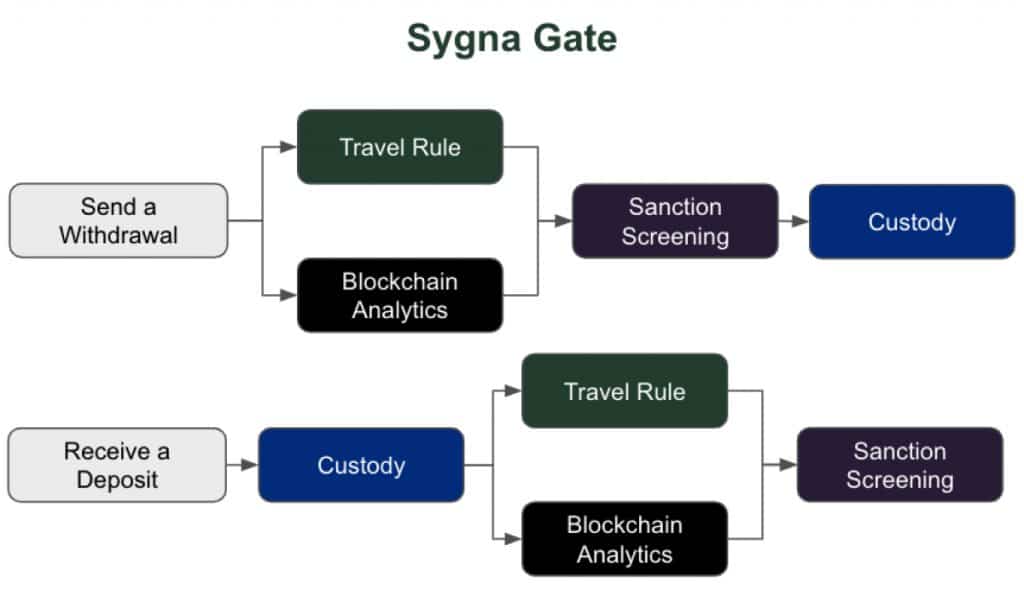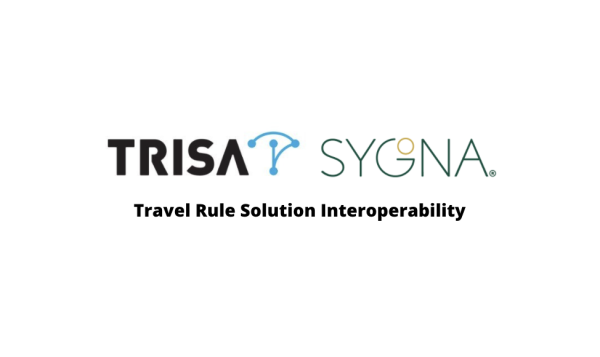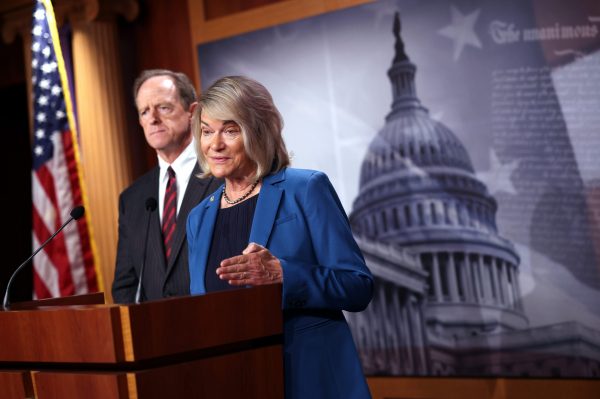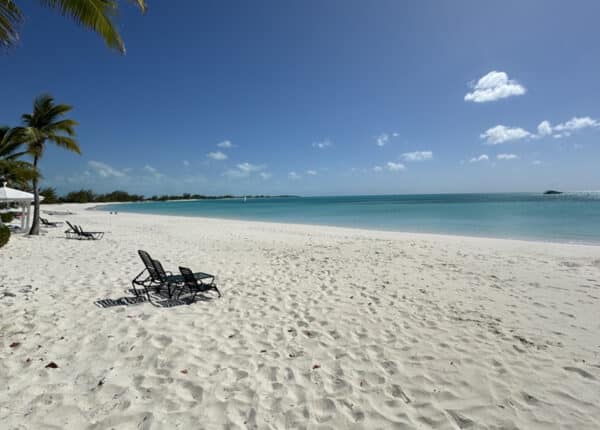What you need to know about implementing the Travel Rule

Implementing the Travel Rule: A Primer
Over the last few years we have seen global regulators — from Singapore to Hong Kong, the U.S. to the U.K — focus on cryptocurrencies in white papers, guidance, advisories and enforcement actions. Many of those discussions have centered around one regulation: the Travel Rule.
Also known as the “funds transfer record keeping regulation” and “FATF Recommendation 16”, the travel rule requires virtual asset service providers (VASPs) and other financial institutions to exchange originator and beneficiary identifying information with counterparties during certain threshold transactions. What does this mean? It means that crypto businesses are currently, or in-the-not-so distant future will be, required to provide customer details to the next institution to which funds are traveling.
And while the Travel Rule has been discussed and debated, we are now hearing a louder drumbeat for implementation. On that front, practical challenges remain. On February 8, TRM Talks is joined by a panel of experts on travel rule compliance: Pelle Brændgaard, CEO and co-founder of Notabene; Tamsyn Harrison, Senior Legal Associate at Luno; and Malcolm Wright of InnoFi Advisory and Global Digital Finance. In the lead up to TRM Talks Travel Rule, check out the primer below and don’t get called for traveling 🏀
Travel Rule timeline
June 2019: FATF drops the travel rule on crypto businesses
In June of 2019, the Financial Action Task Force (FATF) provided guidance to a wide swath of crypto businesses (also known as “virtual asset service providers or VASPs). The guidance set forth that VASPs should be required by their regulators to pass information about customers to one another when transferring funds in an information sharing effort designed to mitigate the risk of money laundering and other financial crime. The provision, commonly known as the the travel rule, requires VASPs to exchange originator and beneficiary know-your-customer (KYC) information with counterparties for transactions over a certain threshold. FATF’s recommended threshold is $1000 Euros, but the number differs by jurisdiction.
The FATF recommendation states that when crypto businesses send money, they must:
"... obtain and hold required and accurate originator [sender] information and required beneficiary [recipient] information and submit the information to beneficiary institutions ... if any. Further, countries should ensure that beneficiary institutions ... obtain and hold required (not necessarily accurate) originator information and required and accurate beneficiary information ..."
Under the FATF travel rule guidance, the required information for each transfer includes:
- (i) originator’s name (i.e., the sending customer);
- (ii) originator’s account number where such an account is used to process the transaction (e.g., the VA wallet);
- (iii) originator’s physical (geographical) address, or national identity number, or customer identification number (i.e., not a transaction number) that uniquely identifies the originator to the ordering institution, or date and place of birth;
- (iv) beneficiary’s name; and
- (v) beneficiary account number where such an account is used to process the transaction (e.g., the VA wallet).
July 2021: FATF says it’s time to implement the travel rule guidance
The travel rule today, a longstanding requirement for international banks when sending each other money on customers' behalf, is still a work in progress. In July of 2021, FATF published its " Second 12-Month Review of the Revised FATF Standard on Virtual Assets and Virtual Asset Providers ("the report"). While the report is a follow up to the June 2019 guidance, it encompasses much more. The report, which enlisted the help of TRM and other blockchain analytics providers in order to better understand the data behind illicit finance risks, is a 43-page VH-1 style "where are they now" referendum on regulators, nation states, and VASPs in implementing FATF's previous recommendations including the travel rule.
FATF, concerned with jurisdictional arbitrage, points throughout the report to what it sees as insufficient implementation of the travel rule or the development of so-called travel rule solutions as disincentivizing "the private sector, particularly VASPs, to invest in the necessary technology solutions and compliance infrastructure to comply with the travel rule." FATF writes:
"Overall, there has been further progress [on the travel rule] in the last year. Nonetheless, two years after the FATF revised its Standards, most jurisdictions and most VASPs are not complying with the travel rule. This is a major obstacle to effective global AML/CFT mitigation and is undermining the effectiveness and impact of the revised FATF Standards."
October 2021: FATF says 📣 implement!!
In October 2021, FATF released Updated Guidance For A Risk Based Approach For Virtual Assets and Virtual Asset Providers . That guidance interpreted the definition of VASP to include certain decentralized finance (DeFi) projects, NFT issuers and marketplaces and stablecoin governance bodies. In doing so, FATF potentially expanded the universe of crypto businesses responsible for implementing the travel rule and other AML compliance.
What is the sunrise issue?
While countries have been expected to implement frameworks to ensure travel rule compliance since the 2019 guidance, VASPs seem to have been, for myriad reasons, slow to comply. Therefore, most global regulators have not enforced the requirement and countries are at different stages of travel rule implementation. In fact, some countries are years behind others in terms of implementation. This is known in the cryptoverse as the “sunrise” problem or issue. The sunrise problem could potentially make it risky for VASPs from travel rule compliant nations to do business with exchanges in jurisdictions that are behind on implementation. FATF essentially advises VASPs in travel rule-compliant jurisdictions to take a risk-based approach to doing business with non-compliant VASPs. According to the October 2021, that risk-based approach should include:
- VASPs that have not implemented the travel rule should be considered higher-risk.
- A VASP needs to undertake counterparty VASP due diligence before they transmit the required information.
- Originators and beneficiary VASPs should screen transactions to ensure that the counterparty does not have sanctions exposure.
- In the case of unhosted wallets — where there is not an originator or beneficiary institution — a VASP must still collect the required information with respect to their customer.
- VASPs are expected to engage in robust counterparty due diligence that may include "blockchain analytics services."
The Travel Rule today
What information is a VASP supposed to provide to be travel rule compliant?
According to FATF, the following information should be exchanged between VASPs in a transaction:
Originator Information
Originating VASP should:
Obtain, hold a record of, and submit verified originator KYC information and submitted to the beneficiary VASP at the time of the transfer.
Beneficiary VASPs should:
Obtain and hold the KYC data submitted by the originating VASP; however, it is not required to re-verify this data.
Beneficiary Information
Originating VASP should:
- Submit unverified KYC data about the beneficiary to the beneficiary VASP (obtained from its customer (originator)).
Beneficiary VASP should:
- Obtain unverified beneficiary KYC data from originating VASP and compare it to own verified data of the beneficiary.
Both originating and beneficiary VASPs should:
- Obtain the necessary KYC information from either its customer (in the case of the originating VASP) or from the originating VASP (in the case of the beneficiary VASP)and maintain a record.
- Undertake sanctions screening to confirm that the beneficiary or the originator are not on the U.S. or other sanctions’ list.
- Undertake transaction monitoring with a blockchain intelligence solution, investigate if any red flags for fraud or financial crime, and report to a regulator or law enforcement if consistent with the VASP’s risk based approach.
What do global regulators say about the Travel Rule?
While FATF sets the standards, global regulators have, or are in the process of, implementing the Travel Rule. TRM travel rule solution partner Notabene provides a helpful global overview . The bottom line is that you have countries around the world at different stages of travel rule compliance. You have countries like the United States, Lichtenstein, Canada, Gibraltar, Singapore, Switzerland, and the European Union that have implemented travel rule regulations. Countries such as Japan, South Korea, Germany, and South Africa have plans to implement within the next year or so. But that, much to FATF’s chagrin, leaves a lot of the map without immediate plans to implement.
What’s next?
Soon after the release of the October guidance, TRM Talks sat down with the chairs of FATF's Virtual Assets Contact Group (VACG), Habuchi Takahide of Japan's Financial Services Agency and Jon Fishman of the U.S. Treasury. Watch the recording here . When asked about section 200 of the guidance — which suggests that regulators could allow VASPs to take a "staged approach" to requiring implementation of the travel rule — Mr. Habuchi clarified, "The travel rule implementation is one of the top priorities of FATF's virtual asset work." He continued, "the phased approach is acceptable only to to the extent that it leads to achieving full implementation earlier," (than would otherwise have been possible).
As the calls for implementation heat up, according to Mr. Habuchi, the VACG will focus on (1) working to ensure implementation of the standards globally; (2) continuing to monitor the virtual asset market paying close attention to emerging risks; and, (3) continuing to encourage public private partnerships. In a Coindesk piece this month, FATF president Marcus Pleyer, stayed on message explaining, “The FATF will not proscribe a one-size-fits-all compliance solution to the industry. It is up to businesses to use technology that they find most effective to record and share sender and recipient information. It is heartening to see in recent years how the crypto sphere has evolved with an understanding that growth in this marketplace requires regulation.”
What does all this mean? It means that in 2022 the FATF is going to be putting the pressure on global regulators to implement and enforce a travel rule framework. It also means you should watch TRM Talks: Travel Rule Implementation! Click the banner below to sign-up.

Want more content like this?
- Follow us on social: LinkedIn | Twitter
- Subscribe to our newsletter
- Subscribe to our YouTube channel
- Sign up for future virtual events
TRM Talks FATF's Crypto Guidance: What did we learn?
Fatf provides final guidance, meet jennifer vander veer, product strategist at trm and former fbi special agent, access our coverage of tron, solana and 23 other blockchains.
Fill out the form to speak with our team about investigative professional services.

--> Clifford Chance

Talking Tech
Unravelling the travel rule: aml requirements for cryptoasset businesses, does it increase the urgency for national regulators to implement the rule, the fatf recently updated its guidance for virtual assets and virtual asset service providers (vasps) in october 2021 including on its recommendation 16 that certain transfers of cryptoassets must be accompanied with identifiable originator and beneficiary information. the application of recommendation 16 to vasps has caused controversy, as it is regarded as being very difficult to comply with by the industry..
- In the UK, HM Treasury is beginning to plan for the implementation of the Financial Action Task Force (the "FATF") recommendation that transfers of cryptoassets are accompanied with identifiable information on the originator and the beneficiary (the "Travel Rule").
- The Travel Rule was originally designed for wire transfers. The extension of the existing regime to transfers of cryptoassets which use pseudonymous wallets is not straightforward.
- The Travel Rule creates significant practical compliance challenges for cryptoasset exchanges and custodian wallet providers, particularly as the information required to complete a transfer of cryptoassets is insufficient to comply with the Travel Rule.
This article explores whether the proposed implementation of the Travel Rule in the UK addresses any of the commonly cited practical difficulties with compliance (which are particularly pronounced for unregulated firms or start-ups that may be unaccustomed to being scrutinised in this way) in light of the most recent guidance.
Origins of the Travel Rule
The Travel Rule has its origins in wire transfers. Extending this requirement to transfers of cryptoassets raises difficult compliance obstacles. This is due to the fundamental differences between transfers of fiat currency through traditional financial institutions, and transfers of cryptoassets on a DLT platform using pseudonymous wallets.
In 2012, the FATF adopted Recommendation 16, that transfers of funds must be accompanied by certain identifiable information on the payer and payee. In the context of wire transfers, the Travel Rule has already been widely adopted, including in the UK through Regulation (EU) 2015/847 as applicable by virtue of the European Union (Withdrawal) Act 2018, the "UK Wire Transfer Regulations". This specifies the information on the payee or payer to be included in a payment message, and the circumstances in which a payment service provider is required to verify that information.
How will the Travel Rule work in the UK for transfers of cryptoassets?
In its consultation paper dated July 2021, HM Treasury has stated that the time is now for the UK to begin planning for the implementation of the FATF recommendation on extending the scope of the Travel Rule so that transfers of cryptoassets are accompanied with identifiable information on the originator and the beneficiary of each transfer.
This is intended to apply to:
- cryptoasset exchange providers (including cryptoasset ATMs, peer to peer providers, issuers of new cryptoassets)
- custodian wallet providers (which includes safeguarding and administering cryptoassets and/or the private cryptographic keys on behalf of customers), that are carrying on business in the UK (together, "Cryptoasset Service Providers").
In the UK, the proposed approach is to replicate the requirements under the UK Wire Transfer Regulation for the cryptoasset sector, insofar as is possible. However, HM Treasury notes that it would not be appropriate to simply extend the regime in the UK Wire Transfer Regulation, and so it proposed to modify the Money Laundering, Terrorist Financing and Transfer of Funds (Information on the Payer) Regulations 2017 (the "MLR 2017").
At its core, Cryptoasset Service Providers will need to implement effective systems for providing certain information on the originator and beneficiary as part of transfer of cryptoassets and detecting whether the requisite information on the originator and beneficiary is missing.
What information must accompany transfers of cryptoassets?
In line with the position under the UK Wire Transfer Regulations, the information that must accompany a transfer will depend on its value, and whether all Cryptoasset Service Providers involved in the transfer are carrying on business in the UK.
Transfers below a de minimis threshold (which is expected to be GBP 1,000) only require limited beneficiary and originator information to be sent with a transfer. Where there are multiple transfers from a single originator that appear to be linked and which, taken together, exceed the threshold, then the transfer will need to be accompanied by full beneficiary and originator information.
The HM Treasury consultation proposes that the information set out in the table below should accompany a transfer of cryptoassets.
Some practical challenges with the proposal
The information required to complete a transfer of cryptoassets on a DLT platform is insufficient to comply with the Travel Rule. By definition, cryptoassets are transferred on a blockchain or DLT platform and rely on the use of cryptographic keys. The only information required to complete a transfer of cryptoassets on a DLT platform is: (i) the private cryptographic key, which is required to verify the transfer from the sender's wallet; and (ii) the wallet address of the recipient. The pseudonymous nature of wallet addresses means that it is not possible to identify:
- the operator of the wallet;
- the beneficial owner of the assets in the relevant wallet; or
- where the operator of the recipient's wallet is located.
This generates a fundamental problem for Cryptoasset Service Providers when designing their compliance framework in response to the Travel Rule. Cryptoasset Service Providers are unable to identify from the wallet address whether a counterparty to the cryptoasset transfer is an individual or another Cryptoasset Service Provider, and it is not possible to identify the location of the sender's wallet. This challenge is compounded by the fact that the originator of the transaction (likely the Cryptoasset Service Provider's client) may not have this information.
Peer-to-peer transfers of cryptoassets
As noted, there are crucial differences between wire transfers and cryptoasset transfers, which means some transfers of cryptoassets will not be subject to the Travel Rule. Unlike wire transfers, which take place through systems accessible exclusively to financial institutions, transfers of cryptoassets can occur not just through crypto exchanges but also through other channels, including peer-to-peer transfers.
The HM Treasury consultation notes that any individual can host their own crypto wallet (which are known as 'unhosted wallets') to make and receive transfers. It is envisaged that the Travel Rule will apply only to Cryptoasset Service Providers, not to private individuals using such unhosted wallets. Consequently, peer-to-peer transfers of cryptoassets are outside the scope of these new rules. This is intentional – the FATF recommendations expressly state that individuals are not required to comply with the Travel Rule. The recent FATF guidance provides that where a VASP transfers cryptoassets to an unhosted wallet, it should obtain the information directly from its client. This is an interesting approach given that transfers to unhosted wallets pose a heightened risk of money laundering.
There are practical difficulties for Cryptoasset Service Providers trying to determine which accompanying information should be provided, as there is no reliable way to identify whether the recipient is: (a) another provider or an individual; and (b) located within or outside the UK. Even if the client is able to supply such information, it may not be reliable.
HM Treasury states that there is nothing to prevent a Cryptoasset Service Provider providing additional information with the transfer (such as providing the full beneficiary and originator information in circumstances where the sending Cryptoasset Service Provider does not know the where the recipient is based). It is unclear whether HM Treasury has considered the data privacy implications of such "overcompliance", particularly in light of the fact that HM Treasury confirms that personal data received, transmitted or retained for the purposes of complying with these rules is within the scope of the UK General Data Protection Regulation (see below).
Practical challenges of calculating the value of transfers in GBP
An additional compliance challenge has been identified by HM Treasury. As there is a de minimis threshold for transactions, Cryptoasset Service Providers must determine the method for calculating the value in GBP of transfers of cryptoassets. HM Treasury has acknowledged that the volatility of cryptocurrencies and illiquidity in the crypto-to-fiat exchange market mean that exchange rates can vary across the market, and HM Treasury does not propose to legislate as to how a firm is to calculate the value of a transfer; rather, the consultation has stated that firms must use a " reasonable and justifiable " approach.
In this context, HM Treasury also proposes to apply the linked transactions rule by which the Cryptoasset Service Provider must consider whether transactions are linked, and, if the combined value of the linked transactions exceeds GBP 1,000, they must be treated as a single transaction. Given the ease by which wallets can be created and the tendency of market participants to operate multiple wallets, it may prove difficult to establish when transfers are linked.
Missing information and sanctions screening
Unlike in the context of wire transfers, it is not possible to reject cryptoassets transactions which are made without or with unverifiable underlying information. As such, HM Treasury proposed that cryptoassets should not be made available to the beneficiary instead. The FAFT guidance sets out some proposed mechanisms to achieve this, although these may be difficult to implement in practice, and would erode one of the key attractions of cryptoasset transfers, namely that such transfers are intended to be immutable.
The FATF guidance provides that sanctions screening should take place when conducting transfers of cryptoassets, which raises a similar issue (as cryptoassets transfers cannot be rejected if the sanctions screening has not been completed). The FATF guidance includes some examples of controls that could be implemented to address this, such as putting a wallet on hold until the relevant sanctions screening is completed, or receiving cryptoassets into a provider's wallet that links to a customer's wallet, and moving the transferred cryptoassets to the customer's wallet only after the screening is completed. This would have severe ramifications for the crypto industry, as it would slow down the process for transferring cryptoassets.
It remains to be seen how these requirements would play out in real life and impact the market. There may be interesting contractual ramifications as the contractual obligation to pay for or deliver a particular cryptoasset is unlikely to be discharged until such time as the relevant Cryptoasset Service Provider makes the cryptoassets available to the recipient (not at the moment of transfer).
Data privacy requirements
As mentioned, one of the key features of cryptoassets has been the ability to transact pseudonymously. This may be impacted by the proposed requirements, as Cryptoasset Service Providers will be required to collect, store and potentially share personal information.
Additionally, the implementation of these rules creates a centralised repository of beneficiary and originator information, which must be stored for five years, which raises data privacy concerns. The HM Treasury consultation states that personal data received, transmitted or retained for the purposes of complying with these rules is within the scope of the UK General Data Protection Regulation, and Cryptoasset Service Providers will therefore need to process it in line with the requirements of that legislation.
Are there any solutions?
Industry-wide messaging standards are being developed.
The Travel Rule was originally designed for traditional financial institutions (e.g. banks), and it took over a decade for this rule to be properly implemented through the development of an industry-wide messaging standard (i.e. SWIFT).
In the UK, HM Treasury has stated that it has deferred bringing this rule into effect until now, but it has noted the recent technological developments that may facilitate compliance with the Travel Rule for cryptoassets.
The FATF guidance clarifies that it is not necessary for the relevant information to be attached directly to the transfer of cryptoassets on the blockchain or DLT platform itself. Instead, the information can be provided indirectly or alongside the actual blockchain transaction, using a standardised messaging system.
Not all jurisdictions will have implemented the FATF standards in the same way and to the same degree. Although the FATF has urged national regulators to engage with the private sector to develop potential solutions to facilitate compliance with the Travel Rule, in practice the FATF leaves the issue to the industry, stating that providers will have to conduct due diligence. There are also multiple private sector organisations proposing different solutions. For example, a joint working group between the Chamber of Digital Commerce, Global Digital Finance and the International Digital Asset Exchange Association has developed the InterVASP Messaging Standard Overview to provide a universal common language for the communication of required originator and beneficiary information.
While possible, it seems highly unlikely that there will be consensus in the industry on a common set of messaging standards for cryptoasset transfers. We expect that any industry messaging standards will need to be refined and developed to enable compliance with the rules that are being developed in the UK and internationally.
How will the Travel Rule affect Cryptoasset Service Providers that are already struggling to comply with the existing AML rules?
Based on public records, many Cryptoasset Service Providers that have applied for registration under the MLR 2017 have not sufficiently demonstrated that their AML systems and controls are adequate for registration. This is underlined by the fact that the deadline for firms operating under a temporary registration regime to obtain registration has twice been extended and is now set at 31 March 2022 as " a significantly high number " of businesses could not meet the required standards. This is likely to be due to the FCA applying high standards when assessing the AML systems and controls of Cryptoasset Service Providers.
The introduction of the Travel Rule is likely to increase the challenges that Cryptoasset Service Providers are facing in complying with AML requirements. Whilst the proposal is to implement the Travel Rule in a proportionate way (striking a balance between reducing the harms of illicit finance and supporting innovation), it remains to be seen how such proportionate implementation would operate. In any case, it is likely there will be significant compliance costs in building systems that would allow transmission of data accurately, securely and in a timely manner. This could have significant impact on the industry and customers.
The success of applying the Travel Rule to the crypto industry will largely depend on its homogenous application on a global scale. The FATF guidance has acknowledged the issues that arise due to governments not implementing the Travel Rule simultaneously. In particular, it can be a challenge for a Cryptoasset Service Provider when deciding what approach it should take in dealing with similar service providers located in jurisdictions where the Travel Rule is not yet in force. Further, to the extent that implementation is softer in certain jurisdictions, this may drive providers to these alternative locations in order to avoid having to comply with specific UK requirements.
The release of the updated FATF guidance increases the urgency for national regulators to implement the Travel Rule. Nonetheless, the FATF guidance also provides that regulators may wish to take a staged approach to enforcing the Travel Rule requirements. However, HM Treasury's consultation in the UK is broadly aligned with the most recent guidance. It remains to be seen whether additional changes to the legislation will be made to address some differences.
This article first appeared in Butterworths Journal of International Banking and Financial Law - December 2021
Toolkits & Client Log-in
- Client Portal
- Financial Markets Toolkit
- Talking Tech Insights
- Manage account and preferences
Create test users
- User 0: Remove users and log-out.
- User 1: New user, no prefs or applications.
- User 2: Returning user, legal are, sector and jurisdiction prefs. No applications.
- User 3: Returning user, legal are, sector and jurisdiction prefs. CP approval pending.
- User 4: Returning user, legal are, sector and jurisdiction prefs. CP approval given.
- User 5: Simulate async cookie load from service (upgrades existing to CP approval given)
- User 6: Returning user, legal are, sector and jurisdiction prefs. CP approval given AND CBMCG.
Travel Rule Challenges: FAQ
Get answers to the biggest questions about the controversial crypto Travel Rule.

Alyssa Abrams
Senior Content Manager
This FAQ is based on Sumsub’s “How to Succeed in the Evolving Crypto Market: Adapting to the Travel Rule and Regulatory Changes” webinar, where our guest speakers discussed the main challenges with the Travel Rule.*
*The views presented in this webinar don’t necessarily reflect those of Sumsub.
What is the crypto industry’s main struggle with Travel Rule implementation?
There are few struggles in Travel Rule implementation for the crypto industry, including:
- Non-uniformity among jurisdictions, meaning that countries adopt the Travel Rule based on their own regulations, which may deviate from FATF standards. In particular, jurisdictions may have different de minimis thresholds, varying originator and beneficiary data to be collected and transferred, etc.
- Lack of interoperability , meaning that VASPs use various protocols and solutions that are not always able to interact with each other, complicating communication and data exchange.
- The “sunrise issue” , which refers to uneven implementation of the Travel Rule worldwide, since VASPs may or may not be subject to the Travel Rule given the implementation status in their jurisdiction. “The sun is up” where the Travel Rule is enforced, and “down” where it’s not enforced yet. The “sunrise issue” therefore occurs when one VASP isn’t yet obliged to follow the Travel Rule and therefore doesn’t have the resources to cooperate with one that does.
To address the “sunrise issue”, the FATF spurs cooperation between governments to ensure that the Travel Rule is applied more or less consistently.
Sumsub’s Travel Rule solution deals with these challenges.
What are the most frequent compliance-related issues with the Travel Rule?
Based on on the FATF’s annual report, the most frequent issues include:
- Wrong data collected and transferred (e.g., transaction ID transmitted instead of the originator’s wallet address)
- Wrong chain of communication (e.g., the ordering VASP obtains beneficiary information from the beneficiary VASP instead of collecting it itself)
- Originator and beneficiary information is sent after the transaction is executed
- Only certain types of virtual assets (VA) and/or transaction amounts are supported
- Transmitted information can’t be downloaded or otherwise retained
- Counterparty VASPs can’t be located for all VA transfers.
What are some EU-specific issues with Travel Rule implementation?
The EU plans to harmonize the Travel Rule across all its member states in 2024. At the same time, some challenges may persist, including:
- Compliance with data protection and other regulations. Companies with headquarters in countries like the USA or Switzerland, which have subsidiaries in the EU, will also need to comply with local data protection laws and regulations, like GDPR in the EU, or DPA
- The “sunrise issue” which may occur between the EU and other jurisdictions
- Stricter requirements for transactions with third parties
- Lack of standardized systems to transfer data
What are some UK-specific issues with Travel Rule implementation?
- The “sunrise issue”, as it might put regulated companies at a relative disadvantage compared to non-regulated ones
- Some members of the industry feel like more time and guidance could have been given by regulators to comply with the Travel Rule, including instructions on certain practicalities (e.g., how to treat DeFi)
- Small firms may have to leave the field due to their inability to meet the new requirements
- Issues with manual transactions: transactions are either blocked, because it’s not permitted to send crypto to non-cooperative VASPs, or transactions are delayed because the sender is waiting for data to comply with the Travel Rule
- No standardized Travel Rule solution, leading to providers trying to create their own directories.
What is the difference between a Travel Rule solution, protocol, and network?
Solutions typically implement protocols and integrate networks into a single API, allowing customers to integrate with multiple protocols and networks at once.
Protocols are specification flows and data payloads. Customers should implement protocols internally, or get a solution which implements protocols. There are managed and unmanaged solutions. Get more details regarding managed and unmanaged solutions in the webinar.
Networks are based on solutions and protocols. A network is typically a combination of a protocol and a VASP directory service.
Enter your email to watch the webinar on:
- Existing solutions for effective Travel Rule compliance
- EU regulation of the crypto industry
- UK Travel Rule, and others.
Subscribe to continue reading
Enter your email address to get access to the full article
By providing your email you consent to receiving our newsletter. For further information please see our Privacy Notice
Share this article
Explore more
- Regulatory compliance
- Sep 04, 2023

Arina Rumyanceva
Legal Counsel at Sumsub
- Dec 29, 2022

Oraz Kereibayev
Content manager
- Dec 15, 2022

PROKOPIEV LAW GROUP
CONSULTANTS
- Feb 18, 2023
The Sunrise Issue: Ensuring Effective Implementation of the Travel Rule in the Cryptoindustry
Updated: Mar 24, 2023
The Travel Rule, implemented by the Financial Action Task Force (FATF), requires Virtual Asset Service Providers (VASPs) to collect and share customer information when transferring cryptocurrencies. This rule aims to prevent money laundering and terrorist financing by ensuring that VASPs identify and verify the identity of their customers and share this information with other VASPs involved in the transaction.
However, a significant issue related to the Travel Rule has emerged, known as the Sunrise issue. This issue arises because the Travel Rule applies only to VASPs operating in FATF member countries. VASPs operating in non-FATF member countries are not subject to the exact regulatory requirements, creating a potential loophole that bad actors could exploit.
The Sunrise issue highlights the need for a more comprehensive and coordinated approach to regulating the cryptocurrency industry, which does not leave significant gaps that could be exploited. Regulators and industry stakeholders must work together to address this issue to ensure that the Travel Rule is effective in preventing money laundering and terrorist financing through cryptocurrency transactions.
To address the Sunrise issue, regulators could work to encourage more countries to join the FATF, or explore other mechanisms for extending the Travel Rule to VASPs operating in non-FATF member countries. Another approach would be to promote the adoption of international standards for the regulation of cryptocurrencies, to ensure that regulatory requirements are consistent and effective across different jurisdictions.
The lack of clear guidelines from regulators has also been a significant obstacle to the effective implementation of the Travel Rule. VASPs need clear and detailed guidance on how to comply with the rule, including technical solutions for securely and efficiently sharing customer information.
As a law firm specializing in blockchain and cryptocurrency law, we are well-positioned to help clients navigate the legal complexities of the industry, including regulatory compliance issues like the Travel Rule. Our team of legal experts can provide guidance and support to ensure that your business is compliant with all applicable laws and regulations. Contact us today to learn more about how we can help you achieve your business goals in the blockchain and cryptocurrency space.
DISCLAIMER : The information provided is not legal, tax, or accounting advice and should not be used as such. It is for discussion purposes only. Seek guidance from your own legal counsel and advisors on any matters. The views presented are those of the author and not any other individual or organization. The information provided is for general educational purposes only and is not investment advice. The author of this material makes no guarantees or warranties about the accuracy or completeness of the information. Any action taken based on the information discussed should be reviewed with a professional. The author is not liable for any loss from acting on the information discussed.
- Web3 General
Recent Posts
SAFT: A Simple Agreement for Future Tokens Explained
Rollups Legal Issues: What You Need to Know
What is MiCA, After All?
REGULATIONS
Travel Rule Requirements by Jurisdiction
- Regulators have interpreted and applied the crypto Travel Rule differently.
- Some jurisdictions have enforced the crypto Travel Rule since January 2020, while others have not.
- The FATF recommends applying the Travel Rule to any transaction over $1,000 involving another VASP, but some jurisdictions have different thresholds.
- Jurisdictions require different originator and beneficiary information.
- Some regulators have not yet addressed self-hosted wallet transactions.
- The lack of technological infrastructure and differing interpretations across jurisdictions has led to issues with compliance, known as the "sunrise issue."
- Notabene offers a solution to the sunrise issue with its free Sunrise Plan, which allows VASPs securely responds to unlimited Travel Rule data transactions–independent of their enforcement dates.
Crypto Travel Rule requirements vary by jurisdiction
Since the FATF clarified that the Travel Rule applies to crypto firms, various regulators have interpreted and applied the recommendation differently. Many jurisdictions have varied enforcement dates, Travel Rule thresholds, approaches to required Originator and Beneficiary information, and techniques for handling transactions to self-hosted wallets.
For example, several global regulators and the FATF guidance stipulates that VASPs must apply the Travel Rule to any transaction over $1,000 involving another VASP, whereas current U.S. rules denote $3,000. Some jurisdictions do not specify a threshold. Additionally, the crypto Travel Rule enforcement date varies: South Korea enforced it on March 25, 2022; Estonia began enforcement on June 15, 2022; and Singapore began enforcing it starting January 28, 2020.
These variations are essential to note as companies ramp up their Travel Rule compliance plans and test cross-jurisdictional Travel Rule transactions.
This page dives into four critical components of Travel Rule compliance to provide an overview of the different approaches jurisdictions are using to achieve compliance:
- Enforcement date
- Required originator and beneficiary information
- Transactions to/from self-hosted wallets
Enforcement date: sunrise issue
Regulated VASPs with counterparties located in jurisdictions with unclear or far-off enforcement dates cause issues with compliance. This unique problem is called the ‘ sunrise issue .’
In June 2022, the FATF published a Targeted Update on Implementation and concluded that jurisdictions had made limited progress in introducing FATF’s Travel Rule.
As of March 2022, while 29 out of 98 responding jurisdictions reported having passed Travel Rule legislation, only 11 jurisdictions have started enforcement and supervisory measures. While around a quarter of responding jurisdictions are now in the process of passing the relevant legislation, around one-third (36 out of 98), have not yet started introducing the Travel Rule. This gap leaves VAs and VASPs vulnerable to misuse, and demonstrates the urgent need for jurisdictions to accelerate implementation and enforcement. ( FATF 2022, para 2 ).
The image below provides a non-exhaustive overview of where different jurisdictions stand with Travel Rule adoption.
.webp)
Countries reportedly attribute the delay in rolling out Travel Rule compliance to the lack of scalable technological infrastructure. Despite this, paragraphs 200–201 of FATF’s updated guidance state that countries are expected to implement the Travel Rule as soon as possible and that the sunrise issue should not preclude VASPs from implementing “robust control measures to comply with the Travel Rule requirements.” ( FATF 2021b, pg.64, para 201 )
Notabene's Sunrise Plan
Securely respond to unlimited travel rule data transactions for free, originator and beneficiary customer information.
One fundamental aspect of Travel Rule compliance is the obligation to collect, verify, transmit, and store certain information about the Originator and Beneficiary of a transaction. The image below illustrates the customer information Originator VASPs are mandated to obtain and transmit to the Beneficiary VASP in a Travel Rule–compliant transaction.

The FATF also gives guidance on the obligations that the Originator and Beneficiary VASPs shall have regarding such information.

Yet various regulatory bodies ( Singapore , Switzerland , Canada , etc.) have adjusted the scope of Originator and Beneficiary Customer information that VASPs must collect, verify, and transmit in their jurisdictions. The image below highlights some differences in coverage across a few jurisdictions.

Considering the inherently international nature of crypto transactions, these differences in implementing the FATF’s guidance across jurisdictions create pitfalls to compliance. Learn more in Chapter 4, Section 5 of the State of Crypto Travel Rule Compliance Report.
FATF originally recommended countries to adopt a de minimis threshold of 1,000 USD/EUR, below which Travel Rule requirements would not apply to the transaction. ( FATF 2021b, p. 29, para. 112) However, with the more recent update to their guidance, the FATF changed its approach. While continuing to allow countries to adopt a de minimis threshold, the FATF called out additional compliance obligations regardless of the transaction amount:
191. (...) For VA transfers under the threshold, countries should require that VASPs collect: a. the name of the Originator and the Beneficiary; and b. the VA wallet address for each or a unique transaction reference number. 192. Such information does not need to be verified unless there are suspicious circumstances related to ML/TF, in which case information pertaining to the customer should be verified. ( FATF 2021b, p. 61, paras. 191-192)
Regulatory bodies such as the European Union submitted a similar proposal subjecting all transactions to the Travel Rule regardless of the amount.
Countries' approaches to adopting new threshold ordinance:
- A broader scope of Travel Rule obligations above a de minimis threshold.
Some countries, like Singapore, require a limited scope of shared data below the de minimis threshold. In Singapore, the Ordering VASP must submit Originator Customer and Beneficiary Customer information to the Beneficiary VASP regardless of the transaction amount. However, above the threshold of SGD 1,500, a broader scope of originator information needs to be transmitted. ( MAS 2019 , p. 28, para. 13.4-6)

Learn more on our Singapore jurisdiction page .
- De minimis threshold enforced
Some countries, like Canada, opted to exempt VASPs from Travel Rule obligations when transactions fall below a certain threshold. However, Canada enforces yet another threshold for recordkeeping purposes: Learn more on the crypto Travel Rule in Canada page.
TL:DR; Certain jurisdictions have differences in required information sent at certain thresholds, which adds friction to compliance; staying abreast of each counterparty VASP’s jurisdiction’s particular thresholds and required information for each threshold.
Transactions to self-hosted wallets
Currently, transfers between self-hosted wallets, so-called P2P transactions, are not explicitly covered by AML / CTF rules. The FATF opens the door to a future paradigm change if there is a distinct trend toward P2P transactions. Nevertheless, the FATF’s recent guidance recommends two methods of dealing with transactions to self-hosted wallets.
Jurisdictions take a risk-based approach when regulating P2P transactions and adopt risk-mitigation measures if needed. Below, we transcribe a non-exhaustive list of measures provided by FATF
- controls that facilitate visibility of P2P activity and/or VA activity crossing between obliged entities and non-obliged entities (these controls could include VA equivalents to currency transaction reports or a recordkeeping rule relating to such transfers);
- ongoing risk-based enhanced supervision of VASPs and entities operating in the VA space with a specific focus on non-custodial wallet transactions (e.g., on-site and off-site supervision to confirm whether a VASP has complied with the regulations in place concerning these transactions);
- obliging VASPs to facilitate transactions only to/from addresses/sources that have been deemed acceptable and in line with their RBA;
- obliging VASPs to facilitate transactions only to/from VASPs and other obliged entities;
- placing additional AML/CFT requirements on VASPs that allow transactions to/from non-obliged entities (e.g., enhanced recordkeeping requirements, EDD requirements);
- guidance highlighting the importance of VASPs applying an RBA to dealing with customers that engage in, or facilitate, P2P transactions, supported by risk assessment, indicators, or typologies publications where appropriate; and
- issuing public guidance and advisories and conducting information campaigns to raise awareness of risks posed by P2P transactions (e.g., accounting for specific risks posed by P2P transactions through the assessment of specific users, patterns of observed conduct, local and regional risks, and information from regulators and law enforcement). ( FATF 2021b, p. 39, para 106)
FATF issued Recommendations on how VASPs should transact with self-hosted wallets.
Virtual asset transfers between VASPs and non-hosted wallets were added to the scope of the Travel Rule ( in a specific manner in some instances) in paragraph 179 of its recent October 2021 guidance. The FATF recommends collecting such Travel Rule data from customers of VASPs.
VASPs sending or receiving a VA transfer to/from an entity that is not a VASP or other obliged entity (e.g., from an individual VA user to an unhosted wallet), should obtain the required originator and beneficiary information from their customer. ( FATF 2021b , p. 65, para. 204)
This means:
- When initiating a transaction to a self-hosted wallet, the Originator VASP should require the Originator Customer to identify the Beneficiary of such transaction.
- When receiving a transaction from a self-hosted wallet, the Beneficiary VASP should require their customer (the Beneficiary of the transaction) to identify the Originator.
- Additionally, VASPs should take a risk-based approach when interacting with self-hosted wallets and enforce additional risk mitigation measures if necessary.
The approach to self-hosted wallets across jurisdictions.
Looking at different implementations of the Travel Rule, we were able to identify four distinct approaches to transactions between VASPs and self-hosted wallets by national regulators. Below, we have listed various implementations of these FATF Recommendations by different federal regulations.
- Enhanced due diligence
A lighter approach is taken by countries that require VASPs to apply enhanced due diligence measures when transacting with self-hosted wallets. Liechtenstein is an example of instances where transfers to and from self-hosted wallets are not subject to Travel Rule requirements ( FMA 2021, p. 7, para. 7 )
However, in these cases, VASPs shall enforce enhanced risk mitigation measures such as the following:
- Using blockchain analytics to evaluate the risk of the transaction .
- Collecting documentation about the purpose of the transaction.
In case of transactions to self-hosted wallets that belong to the VASP’s customer, requiring customers to prove ownership of the self-hosted wallet.
- Information collection from VASP’s customer
Other jurisdictions – such as the UK* and Gibraltar** UK and Gibraltar essentially replicate the FATF’s recommendations. ( HMT, 2021, 34 ), ( Gov. of Gibraltar, 4 ) In these cases, VASPs are required to collect from their customer the needed information about the owner of the originating or beneficiary self-hosted wallet; still, VASPs are not required to verify this information.
*The UK did not yet pass laws to implement the Travel Rule. They suggest this approach in the document they submitted to public consultation, but the final approach may change. **It is worth highlighting that Gibraltar only addresses this issue in the context of receiving a transaction from a self-hosted wallet. It is unclear what rules apply when VASPs send funds to self-hosted wallets.

- Identity verification of self-hosted wallet owner
Singapore ( MAS 2020 p.41, para 13.7 ) and Germany ( Scholz 2021, p.2, para 4.3 ) have taken yet another step forward in requiring VASPs to identify and verify the identity of the owner of the Originating or Beneficiary self-hosted wallet.
- Identity verification and proof of ownership
Finally, in Switzerland, the Travel Rule requirements are the same, regardless of whether the transaction is with a VASP or a self-hosted wallet. Switzerland requires VASPs to verify the identity of the self-hosted wallet owner and confirm that the identified owner controls the wallet. ( FINMA 2019, p. 3 )
TL:DR; The requirements applicable to VASPs dealing with self-hosted wallets vary substantially across jurisdictions. In addition to the potential for jurisdictional arbitrage, the lack of solution-oriented guidance on how VASPs can effectively comply with the requirements drives VASPs to take simplified approaches that do not necessarily reflect their risk assessment.
Relevant links:
- FATF (Financial Action Task Force). 2019b . Guidance for a Risk-based Approach to Virtual Assets and Virtual Asset Service Providers .
- FATF. 2021a. Second 12-month review of the revised FATF standards on virtual assets and virtual asset service providers .
- FATF. 2021b. Updated Guidance for a Risk-based Approach to Virtual Assets and Virtual Asset Service Providers .
- FATF. 2022. Targeted Update on Implementation of the FATF Standards on Virtual Assets/VASPs.
- FINMA (Swiss Financial Market Supervisory Authority). 2019. FINMA Guidance 02/2019 Payments on the blockchain .
- MAS (The Monetary Authority of Singapore). 2019 . MAS Notice: PSN02: Prevention of Money Laundering and Countering the Financing of Terrorism – Holders of Payment Service Licence (Digital Payment Token Service).
- MAS 2020. Guidelines to Mas Notice PS-N02 on Prevention of Money Laundering and Countering the Financing of Terrorism .
- Scholz, Olaf. 2021. Verordnung über verstärkte Sorgfaltspflichten bei dem Transfer von Kryptowerten (Kryptowertetransferverordnung – KryptoWTransferV.)
Check out our summaries of Crypto Travel Rule regulations by jurisdiction below.
Global crypto travel rule requirements.
Our comprehensive country guides and pages provide essential information on the enforcement status, threshold amount, and self-hosted wallet obligations in each jurisdiction. This information is invaluable for businesses seeking to navigate and comply with the Travel Rule requirements.
European Union
Liechtenstein, netherlands, philippines, south africa, south korea, switzerland, united kingdom, united states, regulations.
While most virtual asset activity is safe, bad actors take advantage of virtual assets for illicit activities. Introducing regulations to help control that and put mechanisms in place makes it a safer environment for consumers and businesses alike and will ultimately help bring more crypto adoption.
In early 2019, the FATF issued guidance that required virtual asset service providers and financial institutions participating in a transaction to exchange relevant beneficiary and originator KYC information. FATF member governments ratified these guidelines in June of 2019, with regulators from global jurisdictions following suit. The Travel Rule is now mandated to most crypto businesses globally.
Founded in 1989, the Financial Action Task Force (FATF) is an inter-governmental global money laundering and terrorist financing watchdog that sets international standards to prevent illegal activities like terrorist financing and money laundering. In 2018, the FATF adopted changes that now explicitly cover financial transactions involving virtual assets.
FATF has created a new definition of businesses operating in the crypto space that they call a VASP (Virtual Asset Service Provider). These VASPs now need to become licensed in jurisdictions they operate in. The Travel Rule probably does apply if your business is involved in: - Exchange of cryptocurrency (both crypto-fiat and crypto-crypto) - Transfer of cryptocurrency - Providing financial services related to the issuance, initial offer, and sale of virtual assets - Providing custodian wallets
The FATF stipulates that in transactions over a certain threshold, the originator VASPs must include and send the following: - The name of the originator - The blockchain address of the originator - The identity of the originator’s VASP - The originator’s identification number, e.g., National ID number or Passport number - The virtual asset type and the amount being transmitted, and - The identity of the beneficiary’s financial institution - The name of the beneficiary - The blockchain address or account number of the beneficiary *It is important to note that different jurisdictions may require slightly different information. View our jurisdiction pages for more details.
Future business opportunities after complying with the FinCEN Travel Rule are immense. FATF Travel Rule compliance presents the most significant opportunity for virtual assets to become widely accepted in everyday use cases. Cryptocurrency companies that comply will have better access to traditional banking, which will allow easier access to institutional investors. They will also be able to provide more visibility and trust around each transaction for their customers.
Notabene’s end-to-end Travel Rule compliance software was created to solve each component of the crypto Travel Rule on all fronts. Our robust solution and integrations guide businesses to fulfill each Travel Rule compliance requirement:
- Allows VASPs to send Travel Rule data alongside each transmission.
- Automatically recognizing the requirements originator and beneficiary information for each transaction based upon jurisdiction requirements.
- Updates changes to regulatory requirements information in real-time.
- Allows VASPs to set risk-based rules to automate transactions with counterparties that meet their internal risk criteria (e.g., by VASP, jurisdiction, KYT risk score, and sanction screen matches.)
- Identifies wallet type (pre-transaction.)
- Identifies counterparty VASPs.
- Enables VASPs to manage counterparty risk related to non-custodial wallets, including performing ownership proofs, where required by the jurisdiction.
- Hub & Gate
- Travel Rule Toolkit
- Independent Assessment
- Production Test Report
- Videos on Demand
- GDPR Compliance Statement
- Sygna Alliance
Detailed toolkit to understanding the FATF Travel Rule requirements and how to evaluate a technical solution
- Travel Rule
- Integrated Compliance
Crypto AML Compliance: 3 Travel Rule Problems To Solve For VASPs
The ever-changing regulatory landscape for crypto assets may at times represent a minefield of uncertainty for even the most experienced compliance officer to navigate through. This month alone has seen new EU anti-money laundering (AML) legislation proposed this month by the European Commission, the second 12-Month Review of the FATF’s Standards for Virtual Assets and VASPs facing the implementation of the Travel Rule (with updated guidance scheduled for November 2021) while U.S. federal agencies like the SEC and FinCEN continue to take aim at better regulating crypto exchanges and custodians and the services and products they provide.
If you work in crypto compliance, there are most likely 3 Travel Rule issues giving you sleepless nights: Data privacy, the sunrise problem and how to establish a broad yet cohesive AML strategy.
In this article, we’ll look at your most pertinent questions (FAQs), and give examples of how a crypto AML compliance solution like our Travel Rule protocol Sygna Bridge and browser gateway Sygna Gate can help to give you some peace of mind ( and a good night’s sleep).
Before we continue, feel free to recap with our previous 5-part Lens series on how to assess Travel Rule solutions:
- Travel Rule Lens 1: Technology
- Travel Rule Lens 2: Identification
- Travle Rule Lens 3: Implementation
- The 4 FATF Travel Rule Lenses to Assess AML Compliance Solutions (Part 1)
- Travel Rule: Analyzing Sygna Bridge through Its 4 Lenses (Part 2)
Problem 1: Data Privacy
A common refrain we hear is: How can I be sure that my client’s personal data is not going to be broadcast to the world, mined, reused, or hacked?

With personal data protection an increasing priority for jurisdictions and new legislation being rolled out globally, from GDPR in Europe to the POPI act in South Africa, there is a lot of uncertainty on how a FATF Travel Rule solution, which enables VASPs to share personal user information with each other as required by the FATF Standards, avoids legal pitfalls.
Let’s try to unpack these gray areas when implementing Travel Rule compliance using Sygna Bridge
How can I be sure that personal data won’t be exposed during the transmission?
The answer to maintaining data privacy is simple: Encryption. Sygna transmits encrypted personal data exclusively peer-to-peer (P2P) to ensure that only the sender and the receiver have access to it. We designed the protocol to ensure that the data is encrypted before it is forwarded and that only the receiver is able to decrypt it (by using their private key).
Through this design, even if the data were to somehow get lost in the process, no other third party would be able to access it, thanks to the encryption used in our current API.
Is there any risk that my data will be shared automatically to an unauthorized third party?
No crypto compliance solution should allow sensitive data to leak to third parties. Sygna is designed to completely avoid two-way data exchange, where a sender VASP delivers the sender data and the receiver VASP replies with the receiver data.
Two-way exchanges, though popular, present a security threat as senders can create false transactions to try to obtain personal information. One-way data exchange can occur when user information is only shared with the receiver’s approval then passed down to sender VASPs. Sygna uses this model then only requires the sender to confirm the accuracy of the information which greatly reduces data mining risk.
Problem 2: Sunrise Issue

Another industry concern is around the Travel Rule’s so-called “Sunrise Issue” . The FATF Travel Rule’s sunrise headache stems from the different timelines adopted by various jurisdictions to develop and roll out their virtual asset regulatory frameworks. How can a VASP be fully Travel Rule compliant during the sunrise period when others won’t be? We unpack this question below:
Should I wait to implement a TR solution?
The travel rule is being rolled out in each of FATF’s jurisdictions one by one, and service providers are getting denied licenses due to insufficient AML measures. Being proactive and ready ahead of pending but inevitable travel rule regulation reduces the risk of getting fined, disqualified from getting a license but also demonstrates AML efforts to regulators, investors, and customers.
Some Travel Rule protocols such as Sygna are fully developed now and solution providers have created a suite of integrated AML solutions that can help businesses become compliant ahead of the pack.
Will I have to choose one protocol and be restricted by it?
Yes, you should begin with one protocol to start the integration to transfer the required information or you can also choose a solution that is included with multiple protocols so that your platform can benefit from the multiple protocol networks.
For example, Sygna designed its own Travel Rule protocol, Sygna Bridge, in order to provide an environment with maximum security for VASPs to exchange mandatory Travel Rule information.
In addition, we also created Sygna Gate , a software solution to implement different Travel Rule protocols so that users are not limited to one specific network and can send and receive the required data to other different Travel Rule protocol VASPs.
This is in line with the FATF’s expressed wishes during the first 12-Month Review in 2020 that Travel Rule solution providers seek interoperability between their solutions. Since then, Sygna has partnered with AML compliance companies like Elliptic , ComplyAdvantage and CipherTrace to foster interoperability and integrate the best possible analytical tools into our offering. More partnerships and integration are in the pipeline.
What should I do when my counterparty VASP is not Travel Rule compliant?
There are three different scenarios that a VASP could encounter using Sygna’s Travel Rule compliance service when it comes to counterparty VASPs.
- Both VASPs are on the Sygna network.
- A counterparty VASP is using another Travel Rule protocol
- A counterparty VASP has not implemented any Travel Rule protocol at all (sunrise problem)
The first scenario is straightforward enough: VASPs simply use our protocol and API to compliantly share the necessary information with each other.
In the second scenario where the counterparty is using a different protocol, Sygna provides integrated software that can be installed on your local server. The software will identify which VASP the counterparty wallet address belongs to and which protocol it is using, will translate it, and exchange the Travel Rule required information accordingly.
To resolve the last scenario, where a counterparty VASP has not implemented any protocol, we offer an email-based workaround to pre-register the relationship of the wallet and email addresses to help the counterparty VASP manually provide the required data before technically implementing a Travel Rule protocol.
3. Broader AML Compliance

MICA , FATF draft guidance , KYC , Sanction screening, AMLD5 and 6… it’s often said that a week in crypto is a long time, and ever-evolving regulations can make even the most switched-on compliance team feel like they’re stuck on that time-warping planet in the movie Interstellar.
Fear not. While compliance is a marathon, you can certainly sprint your way to the front of the pack with the right approach.
I am an accomplished compliance professional but with little crypto experience. How do I get up to speed quickly on its AML landscape?
Sygna can assist you in completing a full compliance review, leveraging our deep experience in integrating the various components of an AML strategy: travel rule but also transaction monitoring, risk screening, etc. We can alleviate a lot of the burden of trying to piece together a solution by offering you a single platform for crypto AML compliance.
Final Thoughts
We understand that crypto AML compliance can be a daunting challenge for even the most battle-hardened compliance professional. Thankfully, most regulators are aware of this fact and are taking a rather lenient and patient approach to help VASPs get their compliance ducks in a row.
The key takeaway here is that VASPs should be actively engaged in a demonstrable process of reviewing, strengthening, and improving their AML systems in line with these regulations, which in most cases feature some crossover requirements such as customer due diligence, sanction screening, licensing requirements, and suspicious activity reporting as they are rolled out by countries.
We’re here to help guide you through that process. Simply contact us at [email protected] and we can get started. If you have any other questions you’d like answered, please send them to us via the email provided.
Written by Vince Lee (Product Manager ) and Elsa Madrolle (General Manager International)
FATF Plenary Publishes Second 12-month Review of Revised Guidance on Virtual Assets and VASPs
EU Proposes New AML Law to Implement Travel Rule on Private Wallets
You may also like...

TRISA And Sygna Announce Interoperability To Simplify Global Travel Rule Compliance

U.S. Infrastructure Bill’s Crypto Broker & Tax Fracas Shows Regulatory Hill To Climb

Validation by Regulation: Getting Over Crypto’s Existential Crisis
We use cookies to keep the Sygna site reliable and secure, detect and prevent fraud, personalising content and ads, analyze technical and navigational information to better understand how our products and services are being used. Find out more.
Tell us a bit about yourself, and we’ll have an expert reach out to schedule a demo
- Full Name *
- Organization *
- Organization Type * Organization Type* Exchange Government Agency Financial Institution Blockchain Project Other
- Please specify your organization type if not listed above *
- Official Organization Website* *
- Government Agency
- News or Media
- Google Search
- Which Government Agency made you aware of Sygna?
- Name (Person/Company) of referrer?
- Which News or Media outlet did you hear of Sygna from?
- What other source did you hear of Sygna from?
- Check this box to subscribe for updates, news and events from us.
- Phone This field is for validation purposes and should be left unchanged.
Please complete the form below to download the report.
- Official Organization Website *
- Email This field is for validation purposes and should be left unchanged.
Please complete the form below to access the video library and play them on demand.
- Bahasa Indonesia
- Slovenščina
- Science & Tech
- Russian Kitchen
How does a sunrise look after 40 days of darkness?

People welcome the sun rising over Murmansk for the first time since early December 2017 and marking the end of a polar night
For most people, the sun rises every day but spare a thought for the residents of Murmansk (1800 km north of Moscow), the biggest city north of the Arctic Circle. For the locals here, sunrise certainly isn’t taken for granted.
During the final few months of 2017 the polar night lasted no more than 40 days. The sun was a no-show. Luckily this doesn’t mean it was completely dark – it’s more like twilight – nevertheless it’s not a period many people look forward to. As you can imagine, the locals were pretty glad to finally see the sunrise on Jan. 12, 2018 .

Citizens of Murmansk take pictures at the celebration dedicated to the first dawn of 2018.
As with every year, many flocked to a special place outside the city called Solnechnaya Gorka (“Sunny Hill”) to catch the momentous event. Several hundred people celebrated by drinking tea and dancing but they didn’t have long to improve their tans – the sun was up in the sky just for 34 minutes. The days will continue to grow longer though as we approach spring, so there’s plenty more time to soak up some much-needed rays.

The sun was such a rare case in Murmansk for a couple of weeks that it makes sense to greet it with music.

A man welcomes the sun rising over Murmansk for the first time since early December 2017 and marking the end of a polar night.

That is how the sunrise looked like from Solnechnaya Gorka near Murmansk.
Sure living beyond the Polar Circle is no peace of cake. How do Russians handle such dire conditions? Read our special text and you’ll know.
If using any of Russia Beyond's content, partly or in full, always provide an active hyperlink to the original material.
to our newsletter!
Get the week's best stories straight to your inbox
- 5 thrilling ways to have winter fun in Russia
- Are Russians immune to freezing and frigid temperatures?
- A land of endless wonders and achievements: Why is Russia so awesome?
This website uses cookies. Click here to find out more.
9 rules for boarding a flight like a civilized person
Don’t line up at the gate until your group is called. (No, really.)

There’s something about catching a flight — the stress, the time crunch, the hurdles — that puts us all into main-character mode, sometimes at the expense of common courtesies. But no matter how much it feels like it’s us against the world when we fly, in reality it’s a team effort.
“It’s not your aircraft, and there are other people … and your needs are not necessarily any more important than theirs,” said William Hanson, coach and director of the English Manner, an etiquette institute. “That is part of the bargain whether you’re flying first, premium, business or economy.”
That bargain begins with boarding. If we can agree on best practices from the start, the whole travel process can go more smoothly, making flying — and life — better for everyone.
Here, according to travel and etiquette experts, are the unofficial rules to boarding a flight.
Get to the airport on time
A rule so basic we probably don’t need to tell you, but just in case, “get there on time,” etiquette expert and coach Lisa Richey said.
A polite traveler arrives with enough time so they don’t have to inconvenience other travelers. Boarding thrives when you’re at your gate with at least a couple minutes to spare, not if you’re cutting the line at TSA and sprinting through the terminal, whacking travelers with your flailing carry-on bag screaming, “Hold the plane!”
Treat the gate like a hotel lobby, not a picnic
As a rule of thumb, treat the gate like you would a hotel lobby or doctor’s office. You’re there to wait, so get comfortable. But not too comfortable.
Whether you got there hours early or you drew the short end of the stick with a delayed flight, resist the urge to sprawl at your gate or unfurl an elaborate picnic spread. There are other people who would like to share the precious seat-and-floor real estate before takeoff.
Keep phone calls quick and quiet
Millions of Americans these days can work from the car, the lounge or the airport toilet, but that doesn’t mean you always should . If you must take a call during boarding, keep conversations to a minimum, Hanson said. A quick call is perfectly acceptable, but save longer, more involved ones for the privacy of a hotel room.
When you’re talking over everyone at the gate in a deep dive about a business proposal, it sends a message to your fellow travelers that “what I am doing is so much more important than what anyone else around here is doing,” Hanson said. “That goes against every mannerly fiber of mine — and a lot of other people’s — wiring.”
Gather your belongings and boarding pass before you line up
Boarding should be starting any minute; your time has almost come to get out of there. Take these last moments to shift gears into efficiency mode. Toss trash, consolidate bags, refill your water bottle, wrap up your chargers.
As you’re getting your life in order, “know what items you want to access during the flight,” and make sure they’re handy, Alexis Bowen, co-founder of the travel planning company Elsewhere by Lonely Planet , wrote in an email. You don’t want to hold up boarding by digging around your bag for your phone or compression socks later.
Whether your boarding pass is physical or on your phone, have it ready to scan before you get to the gate agent, Bowen said. If it’s digital. Hanson recommends proactively turning your phone’s brightness up to full blast so it can be scanned more easily — thus keeping the line moving as smoothly as possible.
Wait for your assigned turn to board. (No, really.)
It is tempting to crowd the gate in anticipation of boarding, particularly when overhead bin space is limited and many of us carry on bags we’d rather not check. Even travel expert Samantha Brown — the Emmy-winning host of PBS’s “Samantha Brown’s Places to Love” — is guilty of preboarding creep.
“I think the gate agents call us ‘ gate lice ,’” she said.
While lining up as soon as possible may sound helpful, it can actually slow the boarding process down. “If you are there and you’re not boarding, you’re in the way,” Brown said.
Instead, wait until your exact boarding group is called before you approach the gate agents. Don’t try to sneak ahead of your group, either. It’s “a complete waste of time for everybody when you get called out,” Hanson said.
Keep a healthy distance from the boarding area and your fellow travelers, too. No one likes to be crowded.
Don’t disappear into your headphones
When it’s time to hand over your boarding pass to a gate agent or greet the flight attendant on board, take off your headphones or at least pop out an earbud to show you’re a decent human giving another human the time of day. It is very easy to put on headphones and escape the many annoyances of the world with a good playlist or audiobook. It is also easy to forget that it’s rude to wear them while you interact with people.
You’re better off not drifting into a headphone dead zone anyway. “You do sort of need to be attuned to the boarding announcements going on around you,” Hanson said. “Your flight may be canceled, and you’ll be blissfully unaware listening to your podcast.”
Find your seat and sit down fast
You’ve now scanned your ticket and are on the plane, but your responsibilities are not complete. Keep the ball rolling by finding your seat and getting out of the aisle as quickly as possible, so that others behind you can do the same. “Avoid taking excess time to stow luggage and get settled; do whatever you can to not hold up the line,” Bowen said.
If you’re sitting in the aisle seat, Richey says to be conscientious of the rowmates who will be joining you. Stand up when they arrive, instead of making them climb over you to their seat.
Use the overhead bin closest to your seat
While there’s still plenty of room for the taking, do your neighbors a solid by trying to put your luggage close to your seat assignment. If the bin gods look down favorably upon your flight, everyone will be able to fit their bag near them, avoiding the dreaded “my bag’s in the back of the plane, but I’m sitting up in the front” scenario.
But bins do fill up. Be courteous if your bag gets gate-checked , or go with the flow if you have to stash your stuff in a bin far, far away. Whatever you do, “don’t fight over the overhead bin space,” Bowen said.
Which brings us to our last tip:
Remember the Golden Rule
Travel, like so much else, goes much better when people love thy neighbor — even if thy neighbor is hogging the armrest .
Brown has made it a point to “pay it forward” when she’s traveling, like assisting someone with their bag or asking people with mobility issues at the gate whether she can grab them something on her preflight coffee run. “No matter what you’re going through, there’s someone else who is going through it 10 times harder than you are,” she said.
And, if you’re lucky enough to be a frequent flier, Brown said, “spread your capabilities and your know-how to help some other people.”
More travel tips
Vacation planning: Start with a strategy to maximize days off by taking PTO around holidays. Experts recommend taking multiple short trips for peak happiness . Want to take an ambitious trip? Here are 12 destinations to try this year — without crowds.
Cheap flights: Follow our best advice for scoring low airfare , including setting flight price alerts and subscribing to deal newsletters. If you’re set on an expensive getaway, here’s a plan to save up without straining your credit limit.
Airport chaos: We’ve got advice for every scenario , from canceled flights to lost luggage . Stuck at the rental car counter? These tips can speed up the process. And following these 52 rules of flying should make the experience better for everyone.
Expert advice: Our By The Way Concierge solves readers’ dilemmas , including whether it’s okay to ditch a partner at security, or what happens if you get caught flying with weed . Submit your question here . Or you could look to the gurus: Lonely Planet and Rick Steves .

- Skip to main content
- Keyboard shortcuts for audio player
Air travel has gone to the dogs — literally. Here’s what to know about BARK Air
Rachel Treisman

BARK Air officially launched this week, completing its first flight from New York to Los Angeles on Thursday. It also flies to London and aims to add more routes in the coming months. Joe Gall/BARK hide caption
Flying with your dog in first class may sound like a far-fetched dream for many pet lovers. But a new boutique airline launching this week aims to make the “white paw experience” a reality.
BARK Air describes itself as “the world’s first air travel experience designed specifically for dogs first, and their human companions second.”
“BARK Air has taken the white glove experience typical of a human’s first-class experience and redirected all that pampering to pooches – from booking to arrival, to in-flight services and disembarkation, dogs will truly be the VIPs and treated to a positively luxurious, curated experience,” it said in an announcement last month .

Grounded: Emotional Support Animals No Longer Guaranteed Free Flights
BARK Air officially got off the ground on Wednesday afternoon, when its inaugural flight ferried six dogs of varying breeds — from Chihuahuas to a Golden Retriever — and 11 humans (both passengers and crew) from New York to Los Angeles.
The Very Important Pups were treated to chicken-flavored puppuccinos, special cupcakes and a shoe — on a platter — to snack on, according to BARK Chief of Staff Katharine Enos. She told NPR over email that there was “no drama on board.”
“Brooklyn (dachshund) and Eddy (golden) [were] friends and played and the little dogs took nice long naps most of the way,” she added. “After lunch it was nap time for everyone. No potty accidents on board or stolen food either! Everyone felt connected in the way we were obsessed with our dogs.”
Introducing BARK Air: A 100% totally real airline for dogs. We're dog people, and we are tired of there being no truly dog-friendly options when it comes to air travel. Now booking the best-in-class dog focused flight imaginable at https://t.co/eZqVYMC5W3 pic.twitter.com/bzcY2rSO4h — BARK (@bark) April 11, 2024
The airline is a subsidiary of BARK, the company behind dog-focused brands like the subscription service BarkBox. Co-founder and CEO Matt Meeker says he’s been working towards this idea for over a decade.
He was inspired by his late Great Dane Hugo, who traveled with him often but could never fit on a plane — like many non-lap dogs, Hugo would have had to fly in the cargo area rather than the cabin. (Meeker even flew from Florida to New York in a cargo crate to show how disorienting that experience can be, as part of Bark Air’s promotional campaign.)
Many airlines have tightened restrictions for emotional support animals on board in recent years. The logistics and cost of travel can be a highly emotional issue for many families who don’t want to leave their dogs behind when relocating, let alone vacationing, Meeker says.
“We don't think of ourselves as selling dog toys or seats on an airline,” Meeker told NPR in a phone interview. “We think of ourselves as selling awesome emotional experiences with your dog.”

Shots - Health News
The cdc issues new rules for bringing dogs into the u.s., aimed at keeping out rabies.
It’s also an expensive one: BARK Air flights between New York and LA cost $6,000 for one dog and one human (or one human and two dogs collectively under 50 pounds) in each direction, and one-way flights between New York and London go for $8,000.
Potential customers were quick to bemoan the cost, with one social media user joking that her pup would need to start selling “paw pics” to make it work.
Meeker acknowledged that “the price is high, and it’s too high.” But he said innovations, especially related to transportation, often become less expensive over time — and he hopes that will be the case with BARK Air, too.
“We have pretty clear ways of bringing those prices down if the demand is there, and that’s what we aim to do,” he added. “We want to make this affordable and accessible for as many dogs as possible.”
The airline aims to pamper passengers, both pups and people

The airline doesn't have dog size or breed restrictions but only allows humans over age 18 (or 126 in dog years). Joe Gall/BARK hide caption
On BARK Air, the drinks come in bowls, leashes replace seat belts, champagne is made of chicken broth and the bathroom is, well, anywhere.
“When they feel they need to go, they go,” Meeker said of the dog. “And then we clean up after them. And then we clean the plane between every turn.”
It’s one of the many unique perks — and logistical challenges — of an airline for dogs. BARK has partnered with a New York-based charter company called Talon Air, which provides the pilots, flight crew and plane, a Gulfstream V.
The jets accommodate 14 human passengers, but BARK is capping them at 10 to offer extra space. Meeker says it aims to make the experience as comfortable as possible for dogs, starting “even before the flight.”
BARK Air will do a “pup intake” to learn about the dogs’ temperament and preferences. On the day of the flight, humans are advised to show up an hour early to the terminal, where they’ll present their ID and walk straight onto the plane.

Do your kids want a dog? Science may be on their side
“And so what we've bypassed there is a busy commercial airport and a very rigid TSA environment, and treating the dog as just another piece of luggage,” Meeker said.
Dogs and humans get served their meals — and stow away their toys — before the flight takes off to avoid potential territorial disputes. Once in the air, dogs are offered perks like a spa treatment and blankets covered with pheromones for extra comfort. Meeker says the in-flight crew is trained in dog CPR and “fear-free behavioral practices.”
The airline has no dog size or breed restrictions, but humans must be over 18 (aka 126 in dog years). Once on board, humans are advised to keep their dogs leashed as much as possible and ask before approaching others’.
Meeker, who traveled with his dog on two recent test flights between Florida and New York, says people hoped the dogs would misbehave for purposes of the experiment — but they did anything but, even during moments of “pretty significant turbulence.”
“They calmed everyone down, they floated around, they'd take someone’s seat,” he said. “A strange dog, like, not your dog, would wander up, sit on the couch next to you, put their head in your lap, and it’s like, ‘Oh, that’s great.’ ”
He added, “I don’t know why I’m surprised by this, but the dogs made it magical.”
Demand already appears to be taking off

BARK Air is partnering with charter company Talon Air to offer several flights per month. Some are already sold out for June and July. BARK hide caption
Meeker said the initial reaction to BARK Air’s launch has been “really overwhelming and positive.”
BARK Air is offering about four round-trip cross-country flights a month, with several already sold out for June and July. It’s already planning to expand its routes, starting with a New York to Paris trip beginning in the fall.
“About a third of people apparently buy their air travel six months in advance,” he said. “So we just published our schedule through the end of the year in order to serve that crowd better.”
The airline is soliciting requests for additional destinations, and Meeker said it received over 15,000 in the first week alone.
How to keep your pets cool and safe during a heat wave
They’ve heard from military families who are moving, people who travel for business and New Yorkers spending summers outside the city — all of whom want their dogs there too. Meeker also noted significant demand from snowbirds who want to go south with their dogs for the winter and many requests for flights in and out of Chicago.
“We're just processing that information and choosing the dates, and we're learning a lot,” he added.
He hopes the forthcoming data will allow the company to make more cost-effective decisions soon.
“We’re probably doing this the most expensive way we could, which is chartering a private plane from a private owner,” he explained.
The next step would be to make a longer commitment with the charter company, leasing the plane for a month or even a year to bring down costs. Even better would be buying and outfitting a plane. Meeker has his eye on a Boeing 747 model with a back half dedicated to cargo that could serve as an additional source of revenue.
He says this team already has a design that would feature private cabins with lay-flat beds, a central “dog park” and a bar, for dog and human socializing, respectively.
“That’s the dream,” he added. “But it’ll take a little bit of time to get there.”
- airline industry


Airplane Seat Sizes, Quick Refunds, Flight Safety: These New Air Travel Rules Have Been Signed Into Law
The newly passed federal aviation administration (faa) bill includes several measures to protect air travelers. here’s what you need to know..
- Copy Link copied

For travelers who are tired of being packed in like sardines, help could be on the way.
Courtesy of JC Gellidon/Unsplash
Airport delays . Air ticket refunds . The size of your airline seat , and those annoying fees for being able to select a specific seat. These and other perennial hot-button items for fliers were among a slew of issues that were addressed in Congress recently, as lawmakers debated provisions in a massive piece of legislation reauthorizing the Federal Aviation Administration (FAA) for the next five years.
The measure’s passage, which had been delayed for almost a year by partisan wrangling, was hailed as a win for consumers by its supporters. In a statement, Senator Tammy Duckworth (D-Illinois) described it as “the most significant effort by Congress in over a decade to make flying safer, easier and more accessible for passengers with disabilities.”
Now that the bill has been signed into law by President Biden, more details of the 1,000-page doorstopper have emerged. And while on balance there was good news for fliers, not everything that consumer groups sought ended up in the final version.
“Consumers did not get everything we wanted but on balance we’ve seen some things we’ve never seen before [enacted into law],” said William McGee, senior fellow for aviation and travel at the American Economic Liberties Project. As one example, he cited a provision in the law that would require the U.S. Government Accountability Office to conduct a study of how consolidation has affected competition in the airlines. “Some of us been fighting for these kinds of things for 20 years.“
Here are some of the main highlights of the legislation, the initiatives that could affect air travelers the most.
Automatic refunds
The bill codifies a recent U.S. Department of Transportation (DOT) rule requiring airlines to automatically issue refunds to passengers whose flights are canceled or significantly delayed, which it defines as three hours for a domestic flight and six hours for an international trip. This would remove the need for consumers to request a refund, which can take time, but it wouldn’t apply in cases where fliers are offered and accept alternative transportation or travel credits. The requirement would also apply to tickets bought from a third-party seller such as an online travel agency (like Expedia or Booking.com) or travel advisor; the American Society of Travel Agents has asked for the DOT to clarify how this would work, arguing that it could pose a burden to smaller agencies that would have to claw back their payment to the airline.
Minimum seat size
Consumer groups have been fighting for a federal mandate setting minimum standards for airline seats and legroom, arguing that tight seating and crowded flights could impede an evacuation in the case of an emergency. Instead, the bill orders the DOT to revisit seating and evacuation standards and also requires the agency to set up a dashboard so that consumers can compare seating options by airline, similar to the dashboard that DOT set up for air traveler consumer rules.
Fee-free family seating
Families who faced being split up on flights if they didn’t pay up won a victory: Airlines will now be prohibited from charging seat assignment fees to families with children under 14 years old.
Airline vouchers
Future travel credits or vouchers issued to passengers as compensation often have an expiration date of one to two years; the law mandates that these credits remain valid for at least five years.
Customer service
Airlines must make their phone and chat lines available 24/7, free of charge, especially during major disruptions, and without “excessive” hold times.
Accessibility for fliers with disabilities
Airlines and airports have to up their game on accessibility; airline personnel would need to be trained to handle motorized wheelchairs in an effort to reduce the number of wheelchairs that are damaged in transit, and disabled passengers will be allowed to request specific seats. Additionally, the FAA must set up a program to improve accessibility at commercial airports.
Safety improvements
To give air crash investigators an additional tool, the bill specifies that cockpit voice recorders should run for up to 25 hours per journey, up from the current 2-hour duration. Sometimes cockpit recorders are reset as soon as the planes land, which has hindered probes of accidents such as the Alaska air panel blowout . Runway safety was also addressed with more funding for improved warning systems.
Air traffic controller staffing
Staffing shortages at key air traffic control facilities, a serious problem since the airline industry emerged from its pandemic slowdown, have led to major delays in the most congested air travel markets, including New York City. Controller fatigue brought on by working overtime has also been cited as a cause in last year’s rash of near-collisions and other airport mishaps. The law boosts the number of controllers and adds funding for training facilities.


MyCarMakesNoise
10 Unexpected Road Rules You`ll Encounter Abroad
Posted: May 27, 2024 | Last updated: May 27, 2024

Driving is an activity we take for granted, a seemingly universal task shared by people across the globe. However, we often forget how much the rules of the road can vary from country to country. While most traffic laws are founded on common sense and safety, some might leave you scratching your head in bemusement.

Aftermarket Tinted Windows in the United Arab Emirates
The UAE strictly regulates the tint of car windows for safety and security reasons. The law allows only up to 30% tinting for personal vehicles and forbids it entirely for the front windshield to ensure the driver’s visibility isn’t impaired. The police and security services also need to be able to see into vehicles to deter illicit activities. Violation of these rules can lead to hefty fines.

Red Cars in Shanghai, China
Surprisingly, Shanghai once banned red cars from its city center, and they’re still heavily regulated. The reasoning behind this unusual law is due to the belief that red cars cause or attract more accidents than cars of other colors. However, statistics on car accidents involving red cars specifically are inconclusive and often contradict this belief.

Right-Hand Drive Cars in Russia
In Russia, it’s illegal to drive a right-hand drive vehicle due to safety concerns. The country, being left-hand traffic (LHT), views RHD vehicles as a safety hazard, particularly for overtaking on two-lane roads, where the driver’s view of oncoming traffic would be obscured. It’s estimated that nearly a quarter of all vehicles in Russia are RHD, most of them imported from Japan.
Radar Detectors in Switzerland
It’s illegal to own or use a radar detector in Switzerland. This rule is in place to discourage speeding and ensure road safety. In fact, Switzerland has one of the strictest speeding laws globally, with fines calculated based on the speeder’s income. Getting caught with a radar detector can lead to a hefty fine or even imprisonment.

Loud Car Stereos in Australia
In parts of Australia, loud car stereos that can be heard from more than 50 meters away are illegal. This law is meant to combat noise pollution and disturbance. Fines and penalties depend on the state, but in New South Wales, for example, fines can reach up to AUD$200.

Car Horns in some Indian Metropolises
In certain busy Indian cities like Mumbai, there are “No Honking Zones” where car horns are banned. These areas are typically near hospitals, schools, and residential buildings. This rule was implemented to reduce noise pollution, which can be extremely high in densely populated areas.

Diesel Cars in Athens, Greece
Diesel cars are banned from Athens’s city center due to concerns about air pollution. The law, introduced in 1999, aimed to combat the city’s smog problem, termed “Nefos.” Although the ban has been periodically eased during fuel crises, it generally remains in effect.

Dirty Cars in Moscow, Russia
In Moscow, driving a dirty car can earn you a fine. The law, aimed at enhancing the city’s aesthetics, mandates that license plates must be clean and fully visible at all times. While not substantial, the fine is enough of a deterrent for most drivers to keep their vehicles clean.

Cup Holders in France
In France, it’s illegal to eat or drink while driving. This law is extended to the prohibition of cup holders in vehicles, encouraging drivers to avoid distractions and focus on the road. The fine for eating or drinking while driving can be as high as EURâ¬75.

Bluetooth Headsets and Headphones in Spain
In Spain, any device that emits sound, including Bluetooth headsets and headphones, is illegal to use while driving. This is part of Spain’s strict distracted driving laws, aiming to reduce road traffic accidents by ensuring drivers’ auditory and visual capabilities aren’t hindered while driving. The fine for such an offense can reach up to â¬200.
This article originally appeared on MyCarMakesNoise .

More from MyCarMakesNoise
Fast cars symbolize rebellion, but not all are known for safetyâsome even catch fire unexpectedly. And yes, some enthusiasts put airplane engines in century-old cars for kicks. Read More .

The Best 11 Budget Sports Bikes on the Market
Dive into ‘Affordable Adrenaline’ as we steer you through the top sports bikes that promise a heart-racing ride while keeping your finances firmly on track. Read More .

Exploring the World`s Top 10 Airplane Museums
Airplane museums around the world stand as gateways to this fascinating journey through time, housing the magnificent machines that turn the dream of flight into reality. Read More .
More for You
I ranked 12 fast-food double cheeseburgers from worst to best, and my favorite was also one of the cheapest
‘As confused as a goat on AstroTurf’: This retiree is mad his new spouse won't help pay for property taxes, maintenance and insurance — on a home she doesn't own. Who's right?
Weather Warning Urges People in 3 States to Wear Specific Clothes
Unearth Your Next Hobby With These Expert-Recommended Metal Detectors
7 Best Cars for Retirees on a Budget
Centuries-old secret room discovered by joiner at Irish castle
The Best Foods To Eat If You're Hungry At Night
'America will become a renter nation': Grant Cardone warns the US could see 100-year mortgages — says we might even rent our clothes. How to buy real estate without going deep into debt
Scientists think they've finally solved the decades-long mystery of why our Milky Way galaxy is so rare
My Husband and I Bought New Construction. Here Are the Main Reasons We'd Never Do It Again
Jason Kelce Responds to Criticism Over Comments on Harrison Butker
14 Great Places to Live if You Are Broke
Watch: Jack Grealish nearly falls off bus TWICE during Man City title parade
A Quartz Thermal Trap Harnessed the Sun—and Is About to Change Smelting Forever
Movies featuring real-life mother-daughter duos
Why the US can't send humans to Mars
7 Things You Should Never Buy at Trader Joe’s, According to Food Editors
This humanoid robot currently holds the world record for speed
The iconic car that came out the year you got your driver's license
Engineers Just Made Concrete 30% Stronger. The Secret Ingredient? Coffee.

205 Sunrise Cay #2-202, Naples, FL 34114
What's special.
Welcome to 205 Sunrise Cay unit 202, located in the picturesque waterfront community of Port of the Islands in Naples, FL! This stunning condo offers the spaciousness of a house with the convenience of a condo lifestyle. Situated on the second floor, this unit boasts 3 bedrooms and 3 bathrooms spanning over 1800 square feet under air with southern exposure . Step out onto the large screened-in lanai and take in the breathtaking water views. With a single-car attached garage and a boat slip included, this residence is perfect for those seeking both comfort and adventure. Enjoy the open floor plan, ideal for entertaining guests or simply relaxing in the tranquility of waterfront living. Electric roll down shutters provide peace of mind, allowing you to enjoy the outdoor space without worrying about bringing furniture inside during inclement weather. Additionally, roll down shutters adorn all other windows, ensuring safety and security. Navigate the serene waters via the marked channel, offering access to the Ten Thousand Islands for boating and fishing enthusiasts. Nearby attractions include Marco Island and downtown Naples, each just a short drive away. For everyday conveniences, a public supermarket is less than 15 minutes up the road, making this paradise retreat as practical as it is enjoyable. Don't miss your chance to own your own piece of paradise in Port of the Islands! Show more
Likely to sell faster than 97 % nearby
Travel times
Tour with a buyer’s agent.
We’ll find a local expert to take you on a private tour of 205 Sunrise Cay #2-202 .
Next available tour time: Today at 11am
Facts & features, bedrooms & bathrooms.
- Bedrooms : 3
- Bathrooms : 3
- Full bathrooms : 3
- Features : Split Bedrooms
Dining room
- Features : Breakfast Bar, Breakfast Room, Dining - Family
- Features : Pantry
- Central Electric
- Ceiling Fan(s), Central Electric
- Included : Electric Cooktop, Dishwasher, Disposal, Dryer, Microwave, Range, Refrigerator/Icemaker, Self Cleaning Oven, Washer
- Laundry : Laundry in Residence
- Built-In Cabinets, Pantry, Smoke Detectors, Vaulted Ceiling(s), Window Coverings
- Flooring : Tile
- Windows : Window Coverings
- Has fireplace : No
Interior area
- Total structure area : 2,321
- Total interior livable area : 1,814 sqft
Virtual tour
- View virtual tour
- Total spaces : 1
- Parking features : Driveway Paved, Attached
- Garage spaces : 1
- Covered spaces : 1
- Has uncovered spaces : Yes
- Levels : Two Story
- Stories : 1
- Pool features : Community
- Exterior features : Boat Slip
- Patio & porch details : Screened Lanai/Porch
- View description : Canal
- Waterfront features : Canal Front, Intersecting Canal, Seawall
- Has waterview : Yes
- Waterview : Canal
- Lot features : Zero Lot Line
Other property information
- Additional structures included : Cabana
- Parcel number : 75530002309
Construction
Type & style.
- Home type : Condo
- Property subType : Condominium
Material information
- Construction materials : Concrete Block, Stucco
- Foundation : Concrete Block
- Roof : Tile
- New construction : No
- Year built : 1999
Utilities & green energy
- Water information : Central
Community & neighborhood
- Security features : Smoke Detector(s)
- Community features : Pool, Street Lights
- Region : Naples
- Subdivision : SUNRISE CAY
HOA & financial
- Has HOA : Yes
- HOA fee : $6,400 annually
- Amenities included : Bike And Jog Path, Cabana, Community Boat Ramp, Community Gulf Boat Access, Pool, Fish Cleaning Station, Marina, Streetlight
Other financial information
- Buyer's Agency fee : 2.5%
- Transaction broker fee : 2.5%
Other facts
- Road surface type : Paved
Services availability
Make this home a reality, price history, public tax history, monthly payment calculator, neighborhood: 34114, nearby schools, greatschools rating.
- 6 /10 Everglades City School Grades: PK-12 Distance: 10 mi
Nearby homes

$407,900 2 bd | 2 ba | 1.3k sqft 205 Sunrise Cay APT 102, Naples, FL 34114 Off Market No image available for this property
$392,200 -- bd | -- ba | 1.3k sqft 205 Sunrise Cay APT 103, Naples, FL 34114 Off Market No image available for this property
$392,500 -- bd | -- ba | 1.3k sqft 205 Sunrise Cay APT 104, Naples, FL 34114 Off Market No image available for this property
$516,000 3 bd | 3 ba | 1.8k sqft 205 Sunrise Cay APT 202, Naples, FL 34114 Off Market No image available for this property
Local experts in 34114
Similar homes.

$574,900 2 bd | 2 ba | 1.5k sqft 8182 Xenia Ln, Naples, FL 34114 For Sale By Owner No image available for this property
- Collier County
- 205 Sunrise Cay Unit 2-202
Nearby cities
- Ave Maria Real estate
- Chokoloskee Real estate
- Copeland Real estate
- Everglades Real estate
- Goodland Real estate
- Immokalee Real estate
- Marco Island Real estate
- Naples Real estate
- Ochopee Real estate
- Plantation Island Real estate
Nearby neighborhoods
- Golden Gate Real estate
- Lely Real estate
- Lely Resort Real estate
- Moorings Real estate
- Naples Manor Real estate
- Naples Park Real estate
- Orangetree Real estate
- Park Shore Real estate
- Pelican Bay Real estate
- Vineyards Real estate
Nearby zip codes
- 34104 Real estate
- 34109 Real estate
- 34110 Real estate
- 34112 Real estate
- 34113 Real estate
- 34114 Real estate
- 34116 Real estate
- 34117 Real estate
- 34119 Real estate
- 34120 Real estate
Other Naples Topics
- Apartments for Rent in 34114
- Houses for Sale in 34114
- Houses for Rent in 34114
- 34114 Real Estate
- Naples Condos
- Houses for Sale in Naples
- Newest Listings in Naples
- Naples Home Values
- Naples Real Estate Agents
- Naples Refinance
- Naples Mortgage Rates
Sunrise and sunset times in
Home › United States › Idaho ›
Check out today's and tomorrow's sunrise and sunset times in Moscow, ID, United States, as well as the whole calendar for May 2024.
May 28, 2024
First light at 11:22:04 am
Sunrise time: 11:58:04 am
Sunset time: 3:32:44 am
Last light at 4:08:44 am
Day length: 15 hours, 34 minutes
476931 hours, 32 minutes left for today's sunset in
May 29, 2024
First light at 11:21:14 am
Sunrise time: 11:57:22 am
Sunset time: 3:33:42 am
Last light at 4:09:50 am
Day length: 15 hours, 36 minutes
Tomorrow will be approximately 2 minutes longer than today in

- Latitude: 46.732388
- Longitude: -117.000168
Shortest day in Moscow, ID
Longest day in moscow, id.

How Are Sunsets in Other Planets in Our Solar System?

When Is the Shortest Day of the Year?

How Long After Sunset Does It Get Dark?

What Is the Difference Between Golden Hour and Alpenglow?

How Sunset Watching Can Improve Your Mental Health

What Do Pink Sunsets Mean?
May 2024 - , idaho - sunrise and sunset calendar.
Sunrise and sunset times, civil twilight start and end times as well as solar noon, and day length for every day of May in .
The day length increases by 1 hour, 9 minutes over the course of May 2024 , from 14 hours, 30 minutes on the first day to 15 hours, 39 minutes on the last in Moscow, ID.
💡 Got a cool idea? 🤦 Found any errors?
We're always improving this website!
Sunrise and Sunset photos in Moscow, ID
Enjoy this beautiful gallery of images of the sunset and sunrise at Moscow, ID. All images provided by our fantastic community of photographers!
Year distribution of sunrise and sunset times in Moscow, ID - 2024
The followin graph shows sunrise and sunset times in Moscow, ID for every day of the year.
Sunrise Sunset
Check accurate sunrise and sunset times for any day and any location in the world.
Sunrise-Sunset © 2014 - 2024
- Los Angeles
- San Francisco
Information
- Privacy Policy
- Terms of use
- Caribbean Travel Advisor
- Advertising

From All-Inclusive Resorts to Beaches, Travelers Are Falling in Love With Antigua and Barbuda

Sunrise Airways Just Launched Its First Flights to St Kitts, Antigua and Dominica
Sunrise Airways has officially embarked on its Eastern Caribbean expansion.
The newly-reinvigorated regional carrier began its new flights to Antigua, St Kitts and Dominica this weekend.
The new routes are part of a broader push in the intra-regional market, operated on Embraer 120 twin-prop service.

The new flights help fill the void left by the departure of longtime regional airline LIAT.
But Sunrise Airways is not alone. More and more airlines are starting to get into the intra-regional market, including Turk and Caicos’ InterCaribbean and, perhaps most notably, both Frontier Airlines and JetBlue, which have begun adding routes around the region out of San Juan, Puerto Rico.
To learn more, visit Sunrise Airways.

From Anguilla to Aruba, the Best Caribbean Beaches to Visit This Summer
Forget the Hamptons, forget Santorini. And Florida? There’s a reason snowbirds go home in the summer. If you’re looking for a summertime beach getaway, the Caribbean is it. The water is deliciously warm, the trade winds keep you cool and […]
From Belize to Grenada, 10 Little Caribbean Beach Resorts to Visit Right Now

There are different resorts for different vacations, different tastes, different moods. For some, there’s something delicious about a pint-sized, tiny Caribbean resort, where the emphasis is on the intimate, the serene. Where the soundtrack isn’t a piped-in DJ set, but […]
Curacao Travel Is Booming, With More Hotels, Added Flights and a New Energy

The colorful streets of Willemstad; the floating bridge; the all-day party at Mambo Beach; the endless possibilities at Jan Thiel. Curacao has always been one of the most diverse places to visit in the region. Now, travelers have finally started […]

Cancun, Punta Cana and Now Antigua. Royalton CHIC Just Opened Its Newest Resort.
First it was Cancun. Then Punta Cana. Now, Royalton’s CHIC brand, its hip spin on the adults-only all-inclusive concept, has officially debuted on the island of Antigua. The new 235-room resort is the second Royalton-branded resort in Antigua, a beachfront […]
The Caribbean’s Most Exciting New Rooftop Bar Is In Antigua

Sipping on an ice-cold Negroni on a warm Caribbean afternoon, peering out at the super yachts in the Caribbean Sea, a DJ set bumping in the background. This is precisely the purpose of the Caribbean’s newest (and most exciting) rooftop […]
In Antigua and Barbuda, a Must-Visit Caribbean Event for Foodies

From Sheer Rocks to Le Bistro, Nobu Barbuda to Roquita, the dining scene in Antigua and Barbuda has never been buzzier. Now, the destination’s popular culinary event is back again, with more than 65 restaurants participating for this year’s Antigua […]
Sign up for Caribbean Journal's free newsletter for a daily dose of beaches, hotels, rum and the best Caribbean travel information on the net.
- Credit Cards
- All Credit Cards
- Find the Credit Card for You
- Best Credit Cards
- Best Rewards Credit Cards
- Best Travel Credit Cards
- Best 0% APR Credit Cards
- Best Balance Transfer Credit Cards
- Best Cash Back Credit Cards
- Best Credit Card Sign-Up Bonuses
- Best Credit Cards to Build Credit
- Best Credit Cards for Online Shopping
- Find the Best Personal Loan for You
- Best Personal Loans
- Best Debt Consolidation Loans
- Best Loans to Refinance Credit Card Debt
- Best Loans with Fast Funding
- Best Small Personal Loans
- Best Large Personal Loans
- Best Personal Loans to Apply Online
- Best Student Loan Refinance
- Best Car Loans
- All Banking
- Find the Savings Account for You
- Best High Yield Savings Accounts
- Best Big Bank Savings Accounts
- Best Big Bank Checking Accounts
- Best No Fee Checking Accounts
- No Overdraft Fee Checking Accounts
- Best Checking Account Bonuses
- Best Money Market Accounts
- Best Credit Unions
- All Mortgages
- Best Mortgages
- Best Mortgages for Small Down Payment
- Best Mortgages for No Down Payment
- Best Mortgages for Average Credit Score
- Best Mortgages No Origination Fee
- Adjustable Rate Mortgages
- Affording a Mortgage
- All Insurance
- Best Life Insurance
- Best Life Insurance for Seniors
- Best Homeowners Insurance
- Best Renters Insurance
- Best Car Insurance
- Best Pet Insurance
- Best Boat Insurance
- Best Motorcycle Insurance
- Best Travel Insurance
- Event Ticket Insurance
- Small Business
- All Small Business
- Best Small Business Savings Accounts
- Best Small Business Checking Accounts
- Best Credit Cards for Small Business
- Best Small Business Loans
- Best Tax Software for Small Business
- Personal Finance
- All Personal Finance
- Best Budgeting Apps
- Best Expense Tracker Apps
- Best Money Transfer Apps
- Best Resale Apps and Sites
- Buy Now Pay Later (BNPL) Apps
- Best Debt Relief
- Credit Monitoring
- All Credit Monitoring
- Best Credit Monitoring Services
- Best Identity Theft Protection
- How to Boost Your Credit Score
- Best Credit Repair Companies
- Filing For Free
- Best Tax Software
- Best Tax Software for Small Businesses
- Tax Refunds
- Tax Brackets
- Taxes By State
- Tax Payment Plans
- Help for Low Credit Scores
- All Help for Low Credit Scores
- Best Credit Cards for Bad Credit
- Best Personal Loans for Bad Credit
- Best Debt Consolidation Loans for Bad Credit
- Personal Loans if You Don't Have Credit
- Best Credit Cards for Building Credit
- Personal Loans for 580 Credit Score Lower
- Personal Loans for 670 Credit Score or Lower
- Best Mortgages for Bad Credit
- Best Hardship Loans
- All Investing
- Best IRA Accounts
- Best Roth IRA Accounts
- Best Investing Apps
- Best Free Stock Trading Platforms
- Best Robo-Advisors
- Index Funds
- Mutual Funds
- Home & Kitchen
- Gift Guides
- Deals & Sales
- Memorial Day Sales 2024
- Sign up for the CNBC Select Newsletter
- Subscribe to CNBC PRO
- Privacy Policy
- Your Privacy Choices
- Terms Of Service
- CNBC Sitemap
Follow Select
Our top picks of timely offers from our partners

Find the best credit card for you
How chase sapphire reserve's travel insurance made a family crisis a little easier, i hadn't thought about the policy that came with my card. now it's one of my favorite features..

In September 2023, my fiance and I were about to leave on a road trip to New Orleans for my birthday. We had been dreaming of this vacation for more than two years.
Then I got a text from my dad: My grandmother had fallen and broken her hip. She wasn't going to make it and was in hospice.
We unpacked the car and I canceled the vacation rental I had booked. The next few days were spent going back and forth to my grandmother's facility. One night shortly before she died, I was stewing over the whole situation: I was losing someone important and had to cancel my dream vacation . On top of that, I was out nearly $500. Because I canceled the rental after the deadline for a full refund, I was only eligible to get back $243 back of the $717 I paid for the house.
I write about insurance almost every day. But when planning my own trips, like most people, I never imagine anything will go wrong. I was mad at myself for not getting travel insurance .
Then I remembered something: My Chase Sapphire Reserve® , the card I used to book the reservation, came with a built-in travel insurance policy.
Chase Sapphire Reserve®
Earn 5X total points on flights and 10X total points on hotels and car rentals when you purchase travel through Chase Travel℠ immediately after the first $300 is spent on travel purchases annually. Earn 3X points on other travel and dining & 1 point per $1 spent on all other purchases plus, 10X points on Lyft rides through March 2025
Welcome bonus
Earn 75,000 bonus points after you spend $4,000 on purchases in the first 3 months from account opening. That's $1,125 toward travel when you redeem through Chase Travel℠.
Regular APR
22.49% - 29.49% variable
Balance transfer fee
5%, minimum $5
Foreign transaction fee
Credit needed.
Terms apply.
Read our Chase Sapphire Reserve® review.
I love to travel and had been thinking about applying for the Chase Sapphire Reserve card for years: It has an annual $300 travel credit , airport lounge access and reimbursement for Global Entry or TSA PreCheck® — plus 10X points on hotels and 5X on flights booked through Chase Travel℠. I hesitated, though, because of the $550 annual fee . I finally pulled the trigger in early 2023. My fiance and I were planning several international trips and I figured out that we'd be spending enough on bookings to come out ahead.
I paid for a flight to Tokyo with the 60,000 points I earned from the welcome bonus offered at that time. (The welcome bonus is now up to 75,000 points after you spend $4,000 on purchases in the first three months of opening the card.)
Read more: Best credit cards for trip insurance
We used the travel credit toward a luxury hotel on a trip to Toronto and, thanks to the card's Priority Pass benefit, relaxed in the airport's Plaza Premium Lounge before our flight home. Plus, because the Chase Sapphire Reserve doesn't have foreign transaction fees, shopping in Canada didn't come with any unpleasant extra charges.
But I hadn't really looked into the credit card's travel insurance policy before. Turns out it includes:
- Trip cancellation insurance. Reimburses prepaid non-refundable expenses for trips canceled or cut short due to injury or illness, death in the family, severe weather and other extraordinary situations, up to $10,000 per person and $20,000 for the total trip.
- Trip delay reimbursement. Refunds expenses relating to delays longer than six hours or requiring an overnight stay, up to $500 per ticket booked with the card.
- Baggage delay insurance. Reimburses up to $100 per day for five days if your carrier misplaces your bags for more than six hours.
- Lost luggage reimbursement. Luggage lost by the carrier is covered, up to $3,000 per passenger.
- Emergency evacuation and transportation. Transport required for illness or injury is covered up to $100,000.
- Emergency medical and dental coverage. Covers up to $2,500 in medical expenses for incidents occurring more than 100 miles from home.
- Rental car collision damage waiver. Reimburses up to $75,000 if your rental is stolen or in a collision. Kicks in before your auto policy, so you can avoid a premium increase.
Chase Sapphire's offerings are on par with a standalone policy you'd buy from a travel insurance company for about 3% to 5% of a trip's non-refundable expenses. Plus, bundling travel insurance with your card saves you the trouble of getting a new policy with every trip.
Reading the fine print, I couldn't find a reason why my policy with Chase wouldn't cover the balance of our New Orleans reservation. I gathered details of my original booking and refund from the home-share app, a note from a hospice nurse and a copy of my grandmother's death certificate.
Filing an insurance claim is never fun but the process with Chase was relatively painless — I completed the form and submitted my documentation entirely from my phone. Six weeks later, I received an email that my claim had been approved. The $474 was automatically deposited into my checking account, so there was no hassle with a paper check.
I never wanted to file that claim. I wish we had driven to New Orleans, come home, and shared our stories about our adventures with my grandmother. But, sometimes, life has other plans.
The experience convinced me that travel insurance is a must — and that I made the right decision with my Chase Sapphire Reserve card.
Money matters — so make the most of it. Get expert tips, strategies, news and everything else you need to maximize your money, right to your inbox. Sign up here .
Why trust CNBC Select?
At CNBC Select, our mission is to provide our readers with high-quality service journalism and comprehensive consumer advice so they can make informed decisions with their money. Every credit card article is based on rigorous reporting by our team of expert writers and editors with extensive knowledge of credit card products . While CNBC Select earns a commission from affiliate partners on many offers and links, we create all our content without input from our commercial team or any outside third parties, and we pride ourselves on our journalistic standards and ethics.
Catch up on CNBC Select's in-depth coverage of credit cards , banking and money , and follow us on TikTok , Facebook , Instagram and Twitter to stay up to date.
- Chase Sapphire Preferred Card vs. Citi Strata Premier: Which is better for you? Jason Stauffer
- Best business credit card sign-up bonuses — get over $1,000 in value Jason Stauffer
- Americor review — what you need to know Jasmin Suknanan

IMAGES
VIDEO
COMMENTS
The Travel Rule, like the sun, rises at different times around the world.Navigating the "sunrise issue" - the period where Travel Rule enforcement is staggered globally - presents unique challenges for Virtual Asset Service Providers ().Given the borderless nature of crypto transactions, achieving full compliance becomes a complex task for VASPs, particularly those operating in ...
The nonuniformity of the crypto travel rules is popularly called the "Sunrise Problem." Bearing in mind that VASPs are required to exchange transaction details, there is a need for an ...
The FATF is responsible for the Travel Rule, a financial regulation that requires banks, crypto exchanges and other crypto players, as of 2020, to share data on participants (customers) in ...
The sunrise problem could potentially make it risky for VASPs from travel rule compliant nations to do business with exchanges in jurisdictions that are behind on implementation. FATF essentially advises VASPs in travel rule-compliant jurisdictions to take a risk-based approach to doing business with non-compliant VASPs.
Source: Travel Rule Regulations by 21 Analytics and EY Liechtenstein's Travel Rule. The Financial Market Authority (FMA) accounts for the sunrise issue in 2021/18 Instruction and defines ...
The survey asked 56 companies around the world about their travel rule compliance plans. In response, 67% said they intend to be fully compliant by the end of June 2022. At the same time, however ...
The Sunrise Issue, the period when the Travel Rule is not in full effect across all jurisdictions, continues to make it difficult for Virtual Asset Service Providers (VASPs) to comply with the ...
Canadian VASPs have been expected to comply with Travel Rule guidance since June 1, 2021. Cryptocurrency Travel Rule regulations by country Estonia In 2017, Estonia became the first jurisdiction to issue crypto licenses. It has now granted upwards of 4,000 of these licenses. Estonia's Financial Intelligence Unit (FIU) passed Travel Rule ...
The Travel Rule has its origins in wire transfers. Extending this requirement to transfers of cryptoassets raises difficult compliance obstacles. This is due to the fundamental differences between transfers of fiat currency through traditional financial institutions, and transfers of cryptoassets on a DLT platform using pseudonymous wallets.
November 23rd, 2021. | ii. Preface. Task Force Global Implementation of Travel Rule Standards (GI-TRUST) collaborates with global and local organizations to refine the standards of the travel rule, which requires financial institutions and virtual asset service providers (VASPs) to identify originators and beneficiaries of virtual assets (VAs).
United Kingdom ( sometime in 2022) The UK's HM Treasury released a consultation in late 2021 that mandated the FATF Travel Rule. The rule came as an update to existing AML regulations. Cryptocurrency is regulated in the country by the Financial Conduct Authority (FCA), which generally has a pro-crypto attitude.
Difficulty Receiving a Travel Rule Data Transfer ... When implementing the Travel Rule, national regulators are the ones to determine how their Travel Rule framework will address the Sunrise Issue. According to data that the FATF shared in its June 2023 Targeted Update, 11 of 62 jurisdictions that have implemented the Travel Rule or are in the ...
The Travel Rule's "Sunrise" Problem In paragraph 67, the FATF addresses the so-called "Sunrise" issue, which has been a hot topic for the crypto industry in recent months. The FATF Travel Rule's Sunrise issue stems from the difference in the times that various jurisdictions are expected to develop and roll out their virtual asset ...
The 'Travel Rule' is set to take effect on the 1 st September 2023 and the Financial ... The "sunrise issue" which refers to the persistent problem of the Travel Rule not being fully implemented across all jurisdictions continues to present a challenge to cryptoasset businesses dealing with counterparties in jurisdictions where the ...
The "sunrise issue" therefore occurs when one VASP isn't yet obliged to follow the Travel Rule and therefore doesn't have the resources to cooperate with one that does. To address the "sunrise issue", the FATF spurs cooperation between governments to ensure that the Travel Rule is applied more or less consistently.
As jurisdictions and the private sector have implemented the Travel Rule, they have found challenges to implementation, especially between jurisdictions that regulate VAs and VASPs, and those that that do not (the "sunrise issue"). Furthermore, jurisdictions are taking different approaches to some extent to
The Sunrise issue highlights the need for a more comprehensive and coordinated approach to regulating the cryptocurrency industry, which does not leave significant gaps that could be exploited. Regulators and industry stakeholders must work together to address this issue to ensure that the Travel Rule is effective in preventing money laundering ...
The travel rule requires any financial institutions participating in a transaction to exchange relevant beneficiary and originator KYC information. ... paragraphs 200-201 of FATF's updated guidance state that countries are expected to implement the Travel Rule as soon as possible and that the sunrise issue should not preclude VASPs from ...
There are three different scenarios that a VASP could encounter using Sygna's Travel Rule compliance service when it comes to counterparty VASPs. Both VASPs are on the Sygna network. A counterparty VASP is using another Travel Rule protocol. A counterparty VASP has not implemented any Travel Rule protocol at all (sunrise problem)
For most people, the sun rises every day but spare a thought for the residents of Murmansk (1800 km north of Moscow), the biggest city north of the Arctic Circle. For the locals here, sunrise ...
These new regulations will especially affect those aiming to witness the sunrise from Japan's highest peak. The Yoshida Trail, the most popular of the four trails on Mount Fuji, is used by over ...
Remember the Golden Rule; Listen. 7 min. Share. Comment. Add to your saved stories ... More travel tips. Vacation planning: Start with a strategy to maximize days off by taking PTO around holidays.
BARK Air says it built its experience "dog first," offering perks like puppucchinos and pheromone blankets. It's flying between New York and LA or London and plans to add more routes soon.
Automatic refunds. The bill codifies a recent U.S. Department of Transportation (DOT) rule requiring airlines to automatically issue refunds to passengers whose flights are canceled or significantly delayed, which it defines as three hours for a domestic flight and six hours for an international trip. This would remove the need for consumers to request a refund, which can take time, but it ...
This rule is in place to discourage speeding and ensure road safety. In fact, Switzerland has one of the strictest speeding laws globally, with fines calculated based on the speeder's income.
Zillow has 45 photos of this $485,000 3 beds, 3 baths, 1,814 Square Feet condo home located at 205 Sunrise Cay #2-202, Naples, FL 34114 built in 1999. MLS #224045350.
Sunrise and sunset times, civil twilight start and end times as well as solar noon, and day length for every day of May in Moscow. The day length increases by 1 hour, 9 minutes over the course of May 2024 , from 14 hours, 30 minutes on the first day to 15 hours, 39 minutes on the last in Moscow, ID.
Sunrise Airways has officially embarked on its Eastern Caribbean expansion. The newly-reinvigorated regional carrier began its new flights to Antigua, St Kitts and Dominica this weekend.
Moscow is the capital and largest city of Russia.The city stands on the Moskva River in Central Russia, with a population estimated at over 13 million residents within the city limits, over 18.8 million residents in the urban area, and over 21.5 million residents in its metropolitan area. The city covers an area of 2,511 square kilometers (970 sq mi), while the urban area covers 5,891 square ...
Earn 5X total points on flights and 10X total points on hotels and car rentals when you purchase travel through Chase Travel℠ immediately after the first $300 is spent on travel purchases annually.